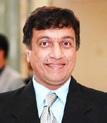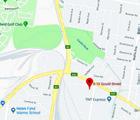





















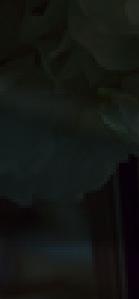

















































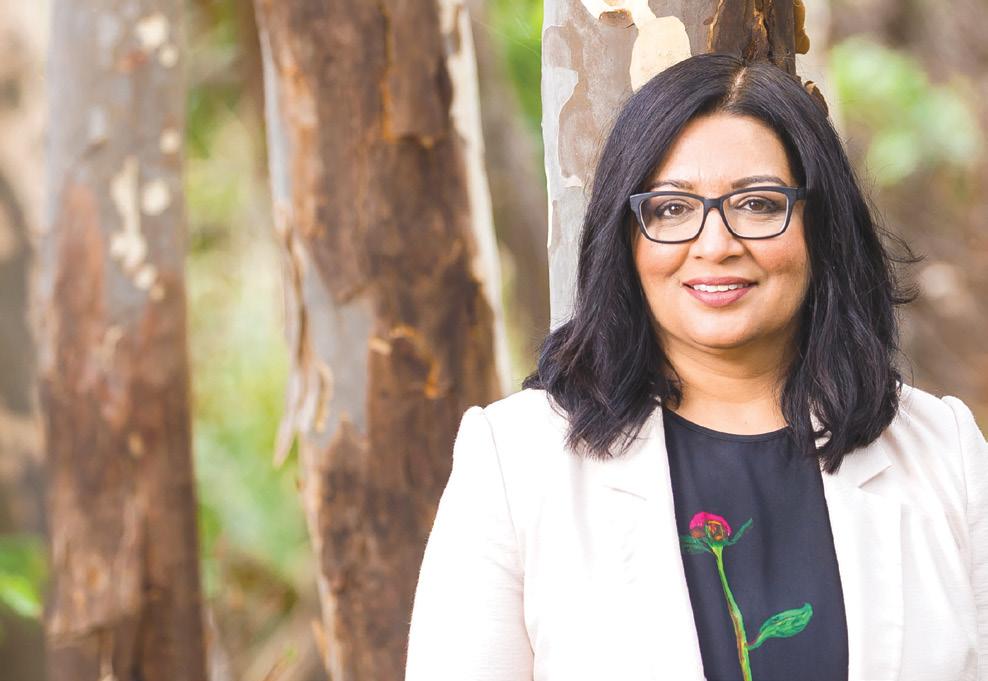

PUBLISHER
Pawan Luthra
EDITOR
Rajni Anand Luthra
DEPUTY EDITOR
Sneha Khale
SOCIAL MEDIA
Neha Malude
MELBOURNE COORDINATOR

Preeti Jabbal
CONTRIBUTORS
Janani Karthik, Minal Khona, Kashif Harrison, Ananya Lahiri
ADVERTISING MANAGER
Shriti Sinha 0410 578 146
ADVERTISING ASSISTANT
Charuta Joshi 02 9279 2004
Indian Link is a fortnightly newspaper published in English. No material, including advertisements designed by Indian Link, may be reproduced in part or in whole without the written consent of the editor. Opinions carried in Indian Link are those of the writers and not necessarily endorsed by Indian Link. All correspondence should be addressed to:
INDIAN LINK MEDIA GROUP
Level 24/44 Market St, Sydney 2000
GPO Box 108, Sydney 2001
Ph: 02 9279-2004
Fax: 02 9279-2005
Email: info@indianlink.com.au

Former Prime Minister Paul Keating was well known for his sharp wit and his cutting oneliners while he was in Parliament. His famous attack on the Senate in 1989, referring to it as the “unrepresentative swill” echoes loud in the folklore of Australian politics. As opposed to the Lower House where there is some clarity on who you are voting for, it takes a mathematical genius and days of tallying up of the votes for the public to know who actually made it to the Senate. And then also, the final result throws up parties which come from a diverse range of standpoints.
The Senate is one of the two Houses of the Federal Parliament, consisting of 76 senators, twelve from each of the six states and two from each of the mainland territories. It shares the power to make laws with the other House of Parliament,
the House of Representatives. Senators are elected for a six-year term, and half the senate is up for election every three years. What is important is that the Senate can put a brake on any bills being passed by the Lower House and this gives them the power to hold the government of the day to account.
With the Australian Federal election just days away, the polling seems to be favouring Labor as the new government post 18 May, although the gap is narrowing. The internal bickering amongst the Coalition and the revolving doors of its leadership still rankle amongst the public and some feel that they need time out from being in government to sort themselves out. The alternative option is the Australian Labor Party which, due to internal party rules, has had stable leadership after the debacle of the Rudd-Gilliard-Rudd Prime Ministership battles. While the mood is pro-Labor, there is concern about their proposed increases, either directly or by removing the current benefits, to certain tax policies. Negative gearing cut backs, changes to superannuation tax thresholds, franking credit benefit
removals for retirees, potential halving of capital gain discounts - Labor appears to have boldly gone where Opposition parties do not go pre-election. They may be a large target to attack now, but if elected, they will claim mandate to bring in these changes. In spite of the voracious attacks by the Coalition on these tax policies, by all accounts it could well be the ALP in power in the Lower House and Bill Shorten in the Lodge a week after his birthday on 12 May.
However, the job of the unrepresentative swill, is to scrutinise the activity of the government of the day. And historically, it is seldom that the same party has controlled both the Lower House and the Senate. During policy debates on the floor of the House, the voting will take place along party lines, but the minor parties – the Greens, One Nation, DerrynHinch Justice Party, Palmer United Australia Party etc, will all have their say. Hopefully they will bring some balance in the debate of the Labor Party’s creed of Equality to the Liberal Party mantra of Opportunity.
The Senate vote this time will be important - cast it wisely.





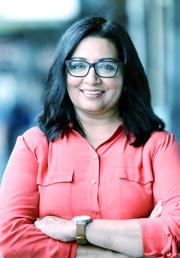
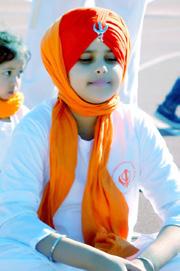

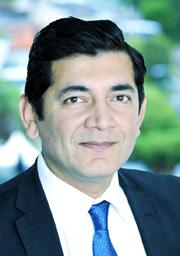


It’s
On



India is more your cup of chai, DARSHAK MEHTA told Australia in a recent article. Edmond Roy wrote: Good luck with that, mate!
Dhanada Mishra tweeted: My good friend Darshak Mehta writes on Australia's relations with India vis-a-vis its China appeasement policy. You can always depend on Darshak to call a spade a spade - no holds barred and no one spared. A must read!

Dhanada Mishra wrote: Indeed! So sad. Hope your article wakes up a few people in India as well as Australia to this unfortunate reality!
Sarita Chand wrote: Great article in Indian Link. But unfortunately it’ll be read largely only by the Indian community; preaching to the converted? You should get (a watered down version?) published in the SMH so it gets a wider audience.
Ashwini Datar wrote: Superb and most important, factual. Hope we get to see more of what we want than what is actually happening.
Suryakant Trivedi wrote: Succinct but hard hitting. It’s a cry in the wilderness though, China is unstoppable.
Ahad Khan wrote: Very succinctly written, Darshak. Love this googly of yours!

USHA RAMANUJAM ARVIND wrote about Pink Sari Inc’s new initiative about Bowel Cancer screening.

Shantha Viswanathan wrote: On behalf of Pink Sari Inc., our sincere thanks to Usha Ramanujam Arvind for the excellent coverage of the launch of our Bowel Cancer Screening initiative, Your Bowel Matters. The Indian Link as a widely read newspaper has the ability to provide a sustaining message to members of the Indian community. Your well written article has articulated the key points about Bowel Cancer and has also been a great encouragement for us to continue with our work. We have been promoting the key message about the importance of completing the Bowel Screen Test to members of the Indian and Sri Lankan communities through information sessions and social media but it is not possible for us to reach out to everyone in the target group without the help of the media. Thanks for your ongoing support.

Our Anzac Day tribute feature on the Indian soldiers who fought alongside Australian and New Zealand soldiers was well liked and shared on social media.
Indian Friends In Sydney wrote: This made us feel proud. Atiya Gazali write: Wow. This is never publicised.
Mohina Raj Garg wrote: Beautiful article! Thanks for sharing.
Joanna Kara wrote: This is amazing. I always think of the Indigenous Australians that fought in both World Wars that were not allowed to vote in the country that they fought for, and at the same time, were literally being exterminated with pesticide. Sejal Gupta wrote: Unfortunately, Indian soldiers were deployed for so many foreign wars under British rule and made to fight for causes that didn't even concern them.
We asked you to identify this monument, the only temple of its kind. Readers Payel Ray, Aribam Premi and Ashish Verma guessed the right answer: Rasmancha monument in West Bengal.

Whoever wins this election, if you’ve let them turn you into a hateful person… you’ve lost.
Vir Das Stand-up comic, on India’s General Elections

You liked our post on NASA’s announcement that India and China are responsible for increasing Earth's green cover in the last two decades
Atiya Gazali wrote: That's so good. Especially about India. Mera Bharat Mahan.
Rani Ramanathan wrote: Wow! Impressive results for the initiative and effort put in by the two countries.
Chitra Iyer wrote: Just back from China - every city was so green.
Prabhat Pathak wrote: A very hard fact to believe.
Nagajun Keshwala wrote: India’s green is not good for the environment, because of (increased) use of fertilizer and pesticides.

Amitabh Singh Raikwar wrote: But most of it is not natural and recently planted, hence has little or no biodiversity in it. Still a positive outlook.
Shekhar Rx wrote: Some good news. I think we all have done a little good. Congratulations India and China.
For a dish you’d happily have everyday, one contestant’s lamb chops with goat’s cheese puree is called ‘honest’ and another’s Egyptian Kushari gets ‘so much culture in this bowl!’ MasterChef season is back and needs less Eurocentricism to stay relevant.
Sukhmani Khorana Culture Studies academic and writer
We congratulated Sandeep Pandit and Dee Williams on making it to MasterChef

Australia’s 2019 Top 24
Sandeep Pandit wrote: Dee and me... Please wish us luck for MasterChef Australia 2019

Rajeshwari Channakrishna wrote: Winning smiles, both of you.
Amit Rawal wrote: Congratulations! Wish you good luck and happy times.
Rene Singh wrote: Wishing you both phenomenal success on your MasterChef journey!
Ingrid Mildon wrote: All the very best you two! I really am enjoying seeing the dishes you cook!
Shruthi Krishna wrote: There are very few people for who the judges taste the food and say please leave your plate here, just go. Ha ha, that was amazing!
Patricia Foenander wrote: Watching you - love your cooking.
Atiya Gazali wrote: Good luck to both. So happy to see people from the subcontinent make it to MasterChef.
Aditya Pandit wrote: Good luck, guys.
Shammi Prasad wrote: Looking forward to watching you guys cook a milestone.
Dee Williams wrote: Thank you all.
Madonna’s supposed version of the Hindu hymn Hanuman Chalisa (in a viral video that looks suspicious) got mixed reactions.

Sanjeevv Malhotra wrote: So sad, it's not a song. The singer should know this as she is performing (it) on stage (like) a rock star. If you really want to pray with Hanuman chalisa, get some knowledge of Indian culture on how to worship.
Suman Arora wrote: That is the beauty of Hinduism… I'm impressed by her pronunciation.
Mohina Raj Garg wrote: I do cherish creativity but not this one. Hanuman Chalisa is not just a mere song to be performed by an artist. Every word of it matters and we mean it when we say it. Didn’t touch my heart.
Indian Friends in Sydney wrote: Perfect!
This Instagram pic has prompted officials to send out a warning against tourists taking selfies at this precarious cliff. We asked our readers if they could guess the name of the place. Readers Ramesh Kundu and Rishabha Chitalia Nayak guessed the right answer: Diamond Bay, Vaucluse in NSW.

Australia too is in the midst of federal elections. Voting is compulsory and those who do not vote are fined $20. In case of non-payment you can be taken to court and are liable to be jailed. Seeing the apathy of rich and middle class voters in India this is worth a try.
Amitabh Kant CEO, NITI Ayog (Govt of India), who toured Australia recently

APARNA ANANTHUNI wrote about the lack of diversity in Australian media. Sukhmani Khorana wrote: A call for higher on-screen visibility: what a cool campaign in fun costumes!

Parting IPL thoughts:
1. RCB, RR and KIX need new coaching staff
2. Pant will now excel with his non selection for the CWC. He’ll be a star.
3. Gill is India’s next superstar.
4. India is amazingly beautiful with the most generous, kind and loving people.
Kevin Pietersen Former England cricketer


Welcome to Indian Link, Prime Minister. Great to be with you.
To use rugby terms, we are almost in the last quarter of the game, where your team started well behind on points. Where do you feel you are now, with respect to the 2019 election, and as captain of the Coalition team, what do you need to do to get over the line on 18 May?
We’re going to keep focusing on what the choice is of this election and explaining that choice to Australians all around the country. It’s a choice between myself as PM and Bill Shorten. It’s a choice between a government that has already legislated and will continue to reduce taxes for all Australians, and not increase them like Bill Shorten and the Labor Party will do. A government that knows how to manage money and is bringing the budget - has brought the budget - back into surplus next year, which means we can pay down Labor’s debt, and a Labor party that will see $387 billion of higher tax and a record of not being able to manage money. You know what, when you can’t manage money you always spend more of it, and you always come after people in higher tax [brackets] to make up for your inability to manage money - that’s what we saw with Labor. It’s a choice between having a stronger economy - the Indian community is our largest source of migrants to Australia, and they came for the opportunity, for their family, for their children, and they want to be part of a stronger economy.There is a much higher proportion of migrants, 1 in 3 in fact, who work for themselves and run their own businesses, and they’ve come here for that.
So they come to the country of opportunity. That’s right. And that’s why our policies, which are designed to ensure that (particularly) small and family businesses continue to do well. That they can be in an economy that’s stronger, and not weighed down by higher taxes, meaning that your money is better off in your hands than the government’s, and you can realise the dream and have the promise that was made in coming to Australia fulfilled.
Prime Minister, you come from a family which seems to be drawn to politics. Your father John Morrison, was a policeman who served on the Waverley Municipal Council for 16 years, including for a brief period as mayor. What drives you?
Family drives me. Family is the most important thing in life for me. But Australian families have three very honest and decent aspirations: they want to be able to get a job, raise their families, and work hard. They want to be able to buy a home and live peacefully in it. And they want to be able to save for their retirement so they can be independent. I want Australians to achieve all of those things, and at this election Bill Shorten wants to tax all of them more and
get in the way of those decent, hardworking aspirations. So as a politician, and particularly as PM, what I am seeking to do, and have been doing is, get the obstacles out of the way and ensure that we can keep the promise to all Australians that you’ll be able to pursue these dreams, that you’ll be able to realise your opportunities, and not have a government penalise you for doing just that, which is what Bill Shorten and the Labor Party propose to do.
During your tenure in politics you served as Minister for Immigration and Border Protection in the Abbott Government; then in the 2014 cabinet reshuffle, you became Minister for Social Services. You were promoted to Treasurer in 2015. And now of course you are Prime Minister. Which one of these posts did you find most challenging and looking back, where do you feel you made the most difference?
I’ve got to say I found them all genuinely equally challenging. They were quite different and needed different skill sets. Serving in each of those portfolios has given me a depth of experience to be doing the job now as PM. You’ve got to have a good understanding of the government’s finances, of what drives the economy, and as treasurer I was able to do that. As Social Services Minister, you need to understand the difficulties and strains that are experienced by Australians often in the most difficult of circumstances like people with disabilities, people with very low
incomes, and ensure that our social safety net can connect to them and that we can get more people off those safety nets and into jobs, because the best form of welfare is a job. And obviously as Immigration Minister, my record in border protection and stopping the boats is reasonably wellknown. But the reason I did that wasn’t just that it was enough to stop the deaths at sea, but because I wanted to protect the integrity of our immigration programs. I’ve always been a big believer in immigration and its role in making our country stronger economically, our society stronger. But I know it only works when Australians show confidence in it, and Australians don’t have confidence in an immigration system when borders aren’t being properly protected and the Immigration program just sort of runs off on its own and doesn’t have clear rules and rules that aren’t enforced. The people that trust the system, they have to have confidence that it’s being run properly, and I was very proud as an Immigration Minister to have delivered that.
Prime Minister, you are on record talking about the economic benefits of immigration.
In 2016, speaking at Sydney’s Lowy Institute, you emphasised the importance of “keeping the door open on our economy to help increase earning capacity and boost living standards”. But now, you are cutting numbers from 190,000 to 160,000. Is that pandering to the hard right of your party
or are you trying to win support from One Nation voters?
Absolutely not. Again, it’s for the same reason why I protected the bordersAustralians have to have confidence in the program, and our population growth has been running too hot. That’s been putting a lot of pressure on our big cities, particularly in Sydney and Melbourne. When people came to this country as migrants, they didn’t come to sit in traffic jams and have their quality of life deteriorated because of population growth that was getting too great. So we’re managing the migration program to ensure we keep population growth under control so we can keep that promise to the migrants who have come to Australia, that they can enjoy the quality of life in our cities that they came to enjoy. So we’re managing the program responsibly and that’s why we’ve made those changes; to ensure that we can keep the program well supported and that’s what we’re achieving.
But will they find jobs where you’re sending them? Unemployment rate in SA for example is 5.7% compared to 4.3% in NSW and 4.8% in Victoria. Will that not put more pressure on the new migrants?
No, because the areas where people will go are where there are opportunities. And in South Australia, we’re seeing a big turnaround in the economy. We’re seeing a big turnaround in the Tasmanian economy, and there are parts of Australia right around the country who want more migrants. In Sydney and Melbourne it’s getting choked and congested, and that’s where we’re looking to manage the program. But in other parts of the country, they’re very keen to see migrants come, and provide jobs, and to have their support and their involvement in their local communities. So I think it’s a win-win.
There seems to be a sharp growth of independent parties like One Nation, UAP etc. What role do you see for them in Australian politics?
These parties ebb and flow between elections. The thing about independence and these minor parties is they’re not going to run the government, they’re not going to reduce your taxes, they’re not going to keep the economy strong, they’re not going to protect the borders, they’re not going to do any of these things. That’s what the Liberal Party does, with the National Party informing the government. So I would suggest that those who have interest in what some of those smaller parties are talking about, they won’t be able to do anything about it. The large parties on our side of politics - the Liberals and Nationals - we can do something about those issues and that’s why I’m urging people not to vote for the minor parties and vote for the Liberal and National parties, because we’re the ones in government that can take real action on the things that are of concern to Australians.
‘An
Another policy which is creating much discussion in the Indian Australian community is the fairness of your party’s temporary sponsored visa compared to the ALP’s proposal. Your proposal is capped places of 15,000; ALP is uncapped. Your proposal allows families to elect one set of parents only to unite with, ALP allows both sets. The cost of the visa is 4 times the ALP cost. Your thoughts?
Well, we’ve made available that temporary parent visa, and that does provide the opportunity that previously wasn’t available to ensure that people can come and be reunited with their families. One of the things that we do have to do is manage the program responsibly, and there is concern that having an unchecked, unconstrained migration program will only undermine the confidence in the program and contribute more to integrity issues within the Immigration Program itself. It’s just part of our responsible approach to managing immigration. When immigration is managed well, Australians support it very strongly. Under the Labor Party as we saw previously, it wasn’t seen to be handled well and it wasn’t handled well; that can only hurt migrant communities because it makes the program less efficient and as a result there are greater calls in the community for migration programs to be seriously reduced. I don’t want to see that, and that’s why we stand by having proper controls in place and extending the opportunities we can. And if after a bit of time, we think we can do better than that, we certainly will. I wouldn’t trust Labor on these things - they say a lot of things but they rarely do them, and the costs that are ultimately involved and the price is paid, you are paying for in higher taxes. So when Labor says they are offering you something, check your wallet, because that’s where you’ll find the answer to what they’re offering youyou being taxed more.
Talking about India-Australia relations, it seems to be limited to the four CsCommonwealth, cricket, coal and curry. There really does not seem to be a strong connection especially in trade and commerce. The bilateral trade needle is stuck in spite of the rapid growth of the Indian middle class. If re-elected on 18 May, what more steps will you take to take this relationship more forward?
I would certainly make a visit. There’s been invitations for that but I’ve had to have the election and we’ve been very focused on that. But I would be seeking to follow up on those
meetings. I met with PM Modi on several occasions. We’ve had the major piece of work that we had done on commercial relationship with India recently and we’ve responded to that report, so there’s a lot to get on and do there. I agree that the opportunity for the relationship is far greater than what it has been to date and that is a view shared by India as well. And on occasions where we’ve sought to broaden that relationship, there have been some obstacles in trying to get through that in terms of dealing with government and bureaucracy and so on, and we have to persist and try and get through these barriers. Because the synchronicity between Australia and India, I think, is significant. Culturally, we’re aligned. In terms of values, and what we’re about - peace-loving people, rule of parliamentary democracythese are values we all share, and this is why when I often talk on India’s national day, it is a seamless transition from coming to Australia as a citizen of India and becoming a citizen of Australia. There’s no big value shift in doing that. It’s just a natural, and I think an easy transition, because the values of the countries are so similar. They are so aligned between our countries there’s an obvious next step to those relationships.
I’d be looking forward to visit there again; I’ve only been on one occasion and very briefly. My wife has been there many times and she loves it. She absolutely loves it. She’s been keen to take me there just privately for many years.
There is a strong feeling of difficulty in doing business in Australia within the business community in India, after the constant delays and challenges which the Adanis have faced. They have successfully fought off all legal challenges thrown at them by environment and other groups, yet it has taken them this long to get Federal approval for this project. Has there been hyperventilation against the Adani group, and what effects from that flow on to Indian businesses wanting to invest in Australia?
I was very disturbed to hear Tanya Plibersek say, if Bill Shorten is elected PM and Tanya Plibersek will be the Deputy PM, ‘An Indian business cannot be relied upon to grow jobs in Australia’. Now apart from it being deeply offensive to the Indian business community in Australia - I know people of Indian background who are running businesses here employing lots of people and have been immensely successful and highly entrepreneurial - to suggest that Indian business can’t create jobs in Australia as Tanya Plibersek has done, I think is not only deeply offensive but it’s economic nonsense. Remember it was Tanya Plibersek who thought Africa was a country, so we’re not going to take too many tips from her about geography or matters regarding ethnicity of businesses. But when it comes to the relationship, we have to get over those issues. I believe that those types of comments have impacted investor sentiment in Australia, and that’s
Favourite curry to cook?
The girls love butter chicken. Not the most healthy, but it’s a special treat every now and then that I cook for them. I haven’t done too bad on the vindaloo on occasions too by the way, but I’m a big fan of anything to do with the kormas. I also do quite a number of Sri Lankan dishes, and southern Indian dishes - you know, the ones where you cook with coconut oil and coconut milk and you put in some leaves and limes, that adds a bit of a different taste to it. I quite like those, particularly in summer.
Rumours are that you want to write a curry cook book called “Curry Nights with ScoMo”. True or false?
(Laughs) I should, shouldn’t I? I don’t know when I’d get the time. I must admit, all the recipes I use I borrow from the celebrity chefs. I enjoy it. I always found it very relaxing and it’s my meal of choice pretty much anywhere I go. If there’s a curry on, you can find me there.
Perhaps at a later time, Indian Link and PM Morrison can collaborate on a book? (Laughs) Sounds good to me. And we can support one of the local Indian charities. We have a deal on the table, then. Done.

It appears Mrs Morrison has a good sari
collection - have you helped her select these? She looks gorgeous in a sari. She loves wearing them, she just loves the colours and the fabrics. She’s in love with India. She’s been there on a couple of occasions with a small business that she’s involved with. She loves the colour, the culture; it’s so vibrant and every time she comes back she’s just had an absolute ball.
An Indian personality who has made an impression?
Narendra Modi. He’s quite an impressive man, very devoted to his country, and with a very clear sense of India’s independence. I think that’s why he’s had such strong support. India is a very difficult country
why it’s important that Tanya Plibersek doesn’t become the deputy PM of Australia. But beyond that, I think there are equal frustrations of Australians trying to do business in India, and these are the things that together as governments we have to try and overcome.
Finally, your message for the Indian Australian community, in the lead up to the elections?
Firstly, Namaste. More broadly, the reason you have come to Australia is to be part of a country that provides opportunity, that provides choices, that backs your judgment that you’re the right one to make the decisions for you and your family and for your community, and the policies that we’re putting forward at this election are about continuing that. The Labor Party’s higher taxes, not being able to manage money, taking money off you to spend on what they think is important, rather than letting you make your decisions about what you think’s important, I think goes very much against why you would have come to Australia in the first place - whether you’ve come more recently or you came generations ago for a better future for your family and your children. So that choice is there: it’s a choice to keep the promise that you made to yourself and to your children in coming to Australia by having a government, our government, the Liberal National government, which will also keep that promise to you and your family.
manage - I think he knows that better than anyone else. But he’s shown great leadership for India, and has been a very positive leader in the world more generally. I think he’s seen and respected in that way by other world leaders, including myself. I’d love to see him back in Australia. I know the Indian community would love to see him too. Last time he was out he was a rockstar. He’s a very charismatic guy, and a very humble man. I sat with him at a dinner at the MCG once, and it was just the two of us. There were obviously a lot of people there that night but we were at a table together and we talked about everything. Including curries, I gotta say.
Welcome to Indian Link, Mr Shorten. Namaste and thank you for having me on Indian Link.
Your party has been leading in all the polls for a considerable time now but recent reports have indicated a tightening. Where do you feel you are now with respect to the Elections 2019, and what do you need to do to get over the line on 18 May?
I feel that the Labor Party, united, with a plan for the future, is the best plan at this election for the Australian people. We want a fair go for all people. We want to support families with the price of childcare so we’ll give them subsidies; we want to look after older people so we’re going to provide dental care support for older pensioners, and we also want to start taking real action on climate change and help people’s wages get moving. This is real change. By contrast the government is chaotic and divided - when you voted for Tony Abbott you got Malcolm Turnbull, when you voted for Malcolm Turnbull you got Scott Morrison, and when you vote for Scott Morrison you’ll get Pauline Hanson or Clive Palmer. Too much chaos.
Mr. Shorten, there has been an emergence of small political parties in the recent past. What are your thoughts about this? Do these parties have a role to play in politics, or to paraphrase one of the ALP legends, are they the ‘unrepresentative swill’? It’s up to people who they vote for, but you always have to study the details. What Labor has is we are one of the two parties who can form a government. Australians are sick and tired of chaos, they’re sick and tired of politicians squabbling with each other. My plan is to put people first. We’ve got some very exciting foreign policy, we’re very keen to help improve our relationship with India and take itto the next level. But perhaps one thing which would be of particular interest to your media consumers, is we are going to reform and deliver a fairer, long-stay parent visa. Many elderly parents want to reunite with their families living in Australia, but they have to travel to Australia as tourists. This is costly, frustrating, disruptive and exhausting as they ferry between our two countries. Problematically, Mr. Morrison’s Liberals have got an unfair temporary-sponsored parent visa which has a $40,000 fee and is capped at 15,000 people. The visa can only be renewed from overseas, forcing families to send money on costly overseas exchange.

The parent visa issue is causing much discussion in the community at the moment. Your proposal is uncapped and
also allows families to have both sets of parents to unite with. Wonderful for the migrants no doubt, but the criticism is that
it is policy on the run and could well open up waves to ‘grey immigrants’. According to the Migration Program statistics, there are
over 100,000 applications for permanent visas which will flow across. While good for the migrant community, is this not a policy to buy migrant votes?
You can’t have it both ways. You can’t say on one hand we’re ignoring migrants, or on the other hand we’re doing too much. You pick the critique. I pick families. The reality is the cost of childcare is very expensive. Why should people who’ve come to Australia be denied the chance of seeing their parents and grandparents come and visit so they can stay with their family and see the little children? I think this is part of being a multicultural society. People say that this will lead to too many grandparents visiting, but if you’re a working family in this country and your grandparents turn up and are able to help mind the kids, you don’t complain, you just say thank you.
Let’s turn our attention to Indian-origin Australians, who are now about 2.4% of the Australian population and growing. What strikes you most about our community? I think Indian-Australians make good Australians. I think they’ve got a value to faith, value to family, and they’ve got a work ethic second to none. I think being a migrant is a courageous thing to do. I’m not like some of the far right who say we should never have migrants. We’ve got to have an orderly program. You want to make sure that you don’t bring in too many people at one time so that you make sure the infrastructure keeps up, but in my experience Indian migrants tend to be good taxpayers, small business entrepreneurs, and we see them doing very well at schools and universities. So, I think IndianAustralian migration is a net plus for the Australian story in the future.
Mr. Shorten, the Coalition is cutting immigration numbers from 190,000 to 160,000. Where does your party sit on this issue? If you were to win government, will you keep the existing numbers or slash them? I think the government is pumping up its own tyres without actually being truthful. The reality is that the technical number is 190,000. Last year there were 152,000 migrant citizens, this year they’re saying 160,000, so I think their bark is louder than their bite. The reality is that we’ve got the same view - 160,000 - but this government is trying to have it both ways. We’ll be guided by the experts [regarding numbers], but for me migration shouldn’t be a political football.
I am keen to learn your views on the potential of a trade relationship between
LUTHRA about why he deserves a turn in government, about issues of concern within Australia’s
People say that our long-term parental visa program will lead to too many grandparents visiting, but if you’re a working family in this country and your grandparents turn up and are able to help mind the kids, you don’t complain, you just say thank you.
India and Australia. There’s much talk about it but the relationship seems to be limited to the four Cs – Commonwealth, cricket, coal and curry. There really does not seem to be a strong connection in another C - Commerce. The bilateral trade needle is stuck in spite of the rapid growth of the Indian middle class. If elected on 18 May, what steps will you take to move this relationship more forward?
We’re going to unstick the needle. Our exports - we rank 5th behind China, Japan, Republic of Korea and the US. In imports we’re 13th, but I’ve got no doubt we can boost the trade. We’ve got a policy called ‘Future Asia’; Australia and India are secular outward-looking multicultural nations who respect and cherish liberty and democracy. In a practical sense, we support in principle the Ten Priority Recommendations of Peter Varghese’s India Economic Strategy. We want to hold an annual Australia Week in India Trade Missions focusing on the 10 sectors identified in that document. At the moment Trade Missions to India are only held every two years.
I think there’s a number of (other) things we can do. We can teach more South Asian and Asian languages in our schools. We can improve the Asian literacy of Australian company directors. We can do more in terms of air links between Australia and India. The less time it takes people to have to stop somewhere else between Australia and India, ie if we can create an airbridge, then there’s more opportunities for commerce.
I also want to set up a reciprocal internship program to allow recent Australian graduates to help build Asian business capabilities for young Australian professionals to work with the Indian government.

You mentioned the four Cs - but I think there’s another C, Culture. What we have to do is view India not just as a source of students but as a two-way exchange between our universities.
So better soft power exchange?
People are people, always beats everything else.
There is a strong feeling within the business community in India about the difficulty of doing business in Australia, after the constant delays and challenges which the Adanis have faced here. They have successfully fought off all legal challenges thrown at them by environment and other groups, yet it has taken them this long to get Federal approval for their project. Has there been hyperventilation against the Adani group,and what effects from that flow on to Indian businesses wanting to invest in Australia?
I think you’ll find that my view on mining projects shouldn’t be based on the country of origin of the company. More so the quality of the project. I can understand from the press coverage why people might see some of the stereotypical debate, but
this is the case: Indian direct investments are welcome in Australia. Of course [regarding] Australian direct investment, we need to improve opportunities in India, and as you know, that’s not as straightforward as it sounds. But let’s make that a commitment to a shared work in progress.
Mr. Shorten, your message to the Indian Australian community in the lead up to the election?

Namaste, my name is Bill Shorten. I seek to be Prime Minister of Australia.
I acknowledge the contribution of the Indian-Australian community to Australia. No one is ever unhappy when an IndianAustralian family moves next door. They know that their neighbours bring with them a sense of history and pride, a sense of family and hard work. Labor believes
You have attended many Indian community functions. Any which stands out and why?
You never go home hungry! You never go home without having made new friends. We’ve got some shared history. When Gandhi was put in jail, the Australians had to beat the English at the Ashes. The ties of language provide easier opportunities for our countries. Indian-Australians get more involved in the Labor Party. Victorian Labor is very successful in electing Indians - same with the Labor Party more generally, from Western Australia to Victoria.
PM Morrison boasts of his curry making skills. Where can you match him on your knowledge of things Indian?
I’ve studied Indian history. I’m very familiar with 20th century Indian history, and the ethnic and religious challenges. So I would back myself with having some knowledge of Indian history which I think is useful for an understanding of where a society goes.
When you visited India, what struck you most?
The dynamism. Dynamism, history and pride. On the day when it was the anniversary of
Gandhi’s birth, I was struck by the sense of national pride that people had. I went to the government building, and learnt the massive history of the event (of Independence).
in supporting middle and working-class families in this country. A vote for Labor will see real action on climate change and lower energy prices. A vote for Labor will see $2,000 subsidies to families with every child in childcare to help them with cost of living. A vote for Labor will see us getting wages moving again. A vote for Labor will also make sure that we have the best healthcare system in the world, and a vote for Labor will support the pensioners and Commonwealth Seniors Health Card holders to be able to get new support for the cost of dental treatment in their later years. A fair go for all.
Mr Shorten, with but a few days to go now, we wish you the very best in your campaign and look forward to talking with you on the other side.
Favourite order at an Indian restaurant?
My family love butter chicken, but I’m a dry curry man myself. I like some of the Goanese cuisine, I know it’s not strictly Indian, but there’s some great stuff down there.
Your birthday is on 12 May. Should you postpone it for a week, and host a celebration at The Lodge on 19 May, a day after the elections? And if sowould sco-mosas, sorry samosasbe on the menu?
No, but I’ll tell you what matters to me. I want to make sure that the country is run in the interests of the working middle-class people. I’m very proud of our multicultural identity, I think this country works best when we work together, when the pensioners get looked after, when the children are being supported, when small businesses can back themselves and we welcome migration. Samosas will happen: I’m getting fitter during the campaign so I think some indulgences will be good.
CREATOR by Ramesh
Mario-Nithiyendran at Casula Powerhouse
Until 12 May Ramesh Mario Nithiyendran pushes the boundaries of figurative sculpture and ceramic conventions. Creator finds the artist channelling Hindu temple iconography, museum displays and colonial public monuments to form a dialogue with museum practices around the framing of Asian faith based objects. Details www.casulapowerhouse.com
FILM Interview (1970)
Wed 22 May (7.15 pm onwards)
In a tribute to legendary Indian film maker Mrinal Sen (1923 - 2018), the Sydney Asian Art Series 2019 screens his iconic film Interview (1970) at the Art Gallery of NSW in its After Hours program. The screening will be introduced by leading scholar of Bengali cinema, Assoc Prof Malini Guha. Details AGNSW: www.artgallery.nsw.gov.au
STAGE
Folly & Time
Fri 17 May and Sat 18 May (8.00pm) A performance by contemporary Australian choreographer Raghav that creates a matrix of relationships between three characters – two virtual and one physical – who engage in kinetic and verbal dialogue across real and virtual divides. At East Sydney Community and Arts Centre, 34 Burton Street, Darlinghurst. Details 02 9265 9333.
Nritya Rasah
Sat 18 May (3.20pm - 6.30pm)
Be transported to ancient India through a scintillating showcase of Bharatanatyam and Kathak performances. All profits will be donated to the Cancer Council NSW. At Lake Macquarie Performing Arts Centre, 39, Lake Street, Warners Bay. Details 0439 956 932.
Sydney Comedy Festival
Upto 19 May Check out the work of South Asian origin stand-up comics, including Jeeves Verma, Kanan Gill, Nazeem Hussain, Neel Kolhatkar, Rowan Thambar and Suren Jayemanne. Details www.sydneycomedyfest.com.au
Them Heavy People:
Queering The Brown
Wed 22 May (6.30pm - 9.00pm)
Four storytellers tell a true story of their own. This edition is celebrating our queer families. How is it like being queer and brown, growing up queer, stumbling into queerness and maintaining a connection with your community and family?
A night of intimate storytelling and some delicious South Asian food. At 107 Projects, 107 Redfern St, Redfern. Details 02 9167 6999.
Lunch-time yoga and meditation
Mondays Art of Living Sydney presents free lunch-time Yoga sessions from 12:30 pm - 1:30 pm at Level 2, 265 Castlereagh Street, Sydney.
Thursdays The Brahma Kumaris Australia present meditation sessions from 12.15pm - 1.00pm at the Indian Cultural Centre, Level 2, 265 Castlereagh Street, Sydney. Details 02 9223 2702. Register at icc2.sydney@mea.gov.in
Yoga at Spirit of India
11 May onwards: 15-week Yoga course, Saturdays and Sundays. Check out also special yoga classes for children (5-12 years), adults and senior citizens (55 plus). Venues at Wentworthville, Quakers Hill, Pennant Hills, Auburn, Epping, Homebush, Ryde.
Free Yoga class every Wednesday (5.30pm - 7.00pm)
At Indian Consulate Cultural Centre, Level 2, 265 Castlereagh St, Sydney. Free meditation every Saturday (8.30am - 9.15am) at Wentworthville. Details www. spiritofindia.org or call Suresh 0412 202 182 or Raja 0402 789 109.
Yoga and meditation
Thu 16 May (5.30pm - 7.00pm)
SVCC, CGI Sydney in association with Brahma Kumaris Australia cordially invites you for the Yoga and You session to revitalize your mind through meditation. At Level 2, 265 Castlereagh Street. Details 02 9223 2702.
SPIRITUAL
Gayatri Hawan
Sun 19 May (7.00am - 12.00 noon)
Shree Sanatan Dharm Brahman Purohit Maha Sabha Australia Inc invites all devotees to participate in Gayaatri Hawan Yagna. Shree Sita Ram Mandir, 47 Wattle Avenue, Villawood. Details 0433 581 468.
Sant Nirankari Mission Sydney weekly congregations
Sundays (5:30pm to 7:30pm) followed by community meals.
Venue: Sant Nirankari Bhawan, 166 Glendenning Road, Glendenning. Details Devinder 0403 216 084.
SENIORS
Tech savvy seniors
Tech Savvy Seniors program aims to help seniors with little or no digital experience develop skills and confidence in using technology for socialising, accessing servicesor conducting personal business. Training is fun and hands-on, and includes basicintroductory courses on using computers, tablets, smart phones, the internet, email and social media.
Mon 20 May Introduction to Computers
Mon 27 May Introduction to
Internet Part 1
At Guildford Library, Railway Terrace, Guildford. Details 02 87579063.
AASHA
Hornsby Every second and fourth Friday of the month, 11.00am2.00pm. Venue Hornsby Youth and Community Centre, cnr Muriel and Burdett Sts, Hornsby, close to Hornsby Station. Programs feature yoga, music, dance, games, health and tech presentations, health checks and light lunch.
Details 0412 786 569
Crows Nest Every third Wednesday of the month, 10.00am -11.30am. Venue 2 Ernest Place, Crows Nest. Social event with free tea.
Details 02 9439 5122.
WORKSHOPS
Smart Cities at UNSW
Fri 17 May (9.00am - 5.00pm)
UNSW-India Collaboration Workshop on Moving towards Smart Cities will commence with brief talks from each partner showcasing their capability, followed by roundtable discussions in the afternoon. At UNSW Sydney, School of Electrical Engineering Building G17 Room 102, Sydney.
Details 02 9385 1000.
Autism workshop
Sat 18 May and 25 May (1.30pm - 4.30pm) Learn about autism and how to understand behaviour, working together with your school and taking care of yourself as a family member. At Dundas Community Centre, 21 Sturt St, Telopea. Details 0435 967 226.
Ayurveda workshop
Sat 18 May (9.00am - 3.00pm)
Led by Dr Jagdish Bhutada and his partner Surbhi, an amazing Ayurvedic cook, this one-day workshop will introduce key Ayurvedic concepts, practices and recipes that you can use to enhance your physical, mental and spiritual wellbeing. At Blue Labyrinth Bush Retreat, 30 Park Road, Woodford. Details 02 4758 7360.
Negotiations and Influence in an Asian Context
Wed 22 May (9.00am onwards)
A highly interactive training program that combines a world renowned negotiation framework and global insights on crosscultural negotiation with Australian executives' experiences with their Indian counterparts. At Sydney CBD. For details contact Louise Clunies-Ross on 0410 682 226.
Talks on Vedic Sciences
10 to 14 May Sydney Telugu Association presents eminent scientist and Vedic scholar, the founder and Chief Executive of Shri Veda Bharati (Hyderabad)
Dr. RVSS Avadhanulu at West
Epping Community Centre, Dent St, Epping and at Redgum Community Centre, Cnr Lane and Veron St, Wentworthville. Details Murthy Potukuchi 0419 746 534.
Vedic Maths
Fri 17 May (5.30pm - 6.30pm)
Swami Vivekanada Cultural Centre, CGI Sydney will be organising workshop on "Vedic Maths for Students" by Dr. Avadhanulu at Level-2, 265, Castlereagh St, Sydney 2000.
RSVP at icc.sydney@mea.gov.in
Kolkata ‘Rising’: Assoc. Prof. Malini Guha at Sydney Asian Art Series
Tue 21 May (6.00pm - 7.30pm)
Assoc. Prof. Malini Guha presents Kolkata ‘Rising’: The politics of place in recent Bengali cinema at the University of Sydney (Auditorium, Ground Level, F23 Administration Building, Eastern Avenue). Recent scholarship on location shooting in film studies, suggests that footage shot on location contributes to our experience of place, privileges its ability to archive or document the past lives of place through audio-visual means. Guha will demonstrate, a number of contemporary films made in Kolkata engage both directly and indirectly with a series of debates concerning Kolkata’s future as a global city. Details email powerinstitute.events@sydney.edu.au
Trikone Queer Hike
Sat 11 May (10.00am - 3.00pm)
Explore one of Sydney's most beautiful walking tracks, the Spit Bridge to Manly Walk, with the expert guidance of our very own hiking guru, BalaSugavanam! The hike starts from Spit Bridge in Middle Harbour and finishes up in the buzzy beachside suburb of Manly. The meeting point is Bus Stop (Stand A) on Carrington Street (near Wynyard Station).
Details 0469 265 219.
Funding for community projects
Have an idea for a community project that needs funding?
Want to build a community garden?
A safe and inclusive playground? Hold a cultural fair, maybe? NSW residents can now seek funding for projects valued between $20,000 and $200,000, that will make communities more liveable, cultural, accessible, safe, revitalised or healthy. Shortlisted applications will be put out to community voting online. The NSW Government has announced a total of $24.4 million for its ‘My Community Project’. Details www.nsw.gov.au/mycommunityproject
To add your notice email media@indianlink.com.au


Chris Gambian: My parents grew up in India, where it is so easy to see the effects of inequality and injustice every day. Their deep sense of right and wrong rubbed off on me and led me to an awareness of the world around me. It was a very short step to Labor, which places fairness and equality at the heart its agenda.
Vivek Singha: I am passionate about science and technology and the ways it can transform human lives, particularly through medical advancements. The Morrison Liberal Government’s record investment being made in health with 2,000 additional medicines added to the Pharmaceutical Benefits Scheme and the nation’s first sports plan, Sport 2030, encourage active and healthy lifestyles. Record levels of health funding specifically and the many other great Liberal initiatives along with a great leader in Scott Morrison convinced me to join the Liberal Party.
Nikhil Aai Reddy: For far too long, the major political parties have put forward their party agenda rather than putting Australians first. Vital infrastructure is not going ahead because the Federal Government does not work with the State and the State refuses to work with Local Government. And it is everyday Australian families that suffer from politicians playing the blame game. Pauline Hanson and One Nation have been raising the issues that really matter for people of Australia. One Nation started the debate over issues the major parties refuse to speak about - Immigration, Foreign Ownership, Water Security, Energy Prices, Fuel Prices, Safe Schools, and Political Correctness. One Nation is the only party promising to hold major parties into account.
Vinita Costantino: I joined the Animal Justice Party (AJP) as a way of reducing my despondency and immense distress when learning about the abhorrent cruelty animals are subjected to in too many "normalised" contexts. As a psychologist, I promote individual empowerment for good mental health, and given that our laws supported such abhorrent cruelty, I knew the most powerful way to effect change would be through the parliamentary system. Consequently, I joined the AJP and ran as their candidate for Croydon in the 2018 Victorian State Election.
Rajan Vaid: I have joined Fraser Anning’s Conservative National Party as their policies support Australians first: universal home ownership as a national objective, Australian ownership of our infrastructure, manufacturing and agriculture, establishment of a not-for-profit government bank, stop supporting UN, end means of testing for the aged pensioners,etc which are beneficial for the growth of Australians.
Ganesh Loke: I was disappointed with both Labor and Liberal Party, as both have failed Australians and are fighting with e ach
other. Involved in social work in Parramatta, I realised thatmany other people are also similarly disappointed.
In 2013, when the Palmer United Party was formed, I realised that their policies are migrantfriendly and supportive of all Australians. I decided to join and represent them at the Federal election from Parramatta, so that we can raise people’s issues at the highest platform in Australia and help them effectively.
Chris Gambian: I’d like to see a greater focus on education and health, a living wage for people who work hard, and better support for older people. But most of all I’d like to see a greater focus on people. Canberra has become too much of a circus focused on itself: I’d like to be a local MP that puts people first.
Vivek Singha: As your Liberal candidate, I will stand up for people who work hard to get ahead and fight to help local families and small businesses get a fair go. As part of the Morrison Liberal team, I will protect our local quality of life and support local families reduce their cost of living pressures by supporting tax relief; improving access to childcare, and lowering power bills.
Nikhil Aai Reddy: I acknowledge that the community of Petrie are tired of the two major parties that are not listening to their needs and are only playing party politics.
I am standing for the community of Petrie and I’m up against cashed-up opponents. I have resigned my QLD Government Public Service role to run for the people of Petrie. I urge the electors of Petrie to take out insurance by voting for One Nation. If I get elected, I will ensure the government of the day keeps its promises and acts in the best interests of the people. Congestion, energy prices and crime are the biggest issues that people have raised in the electorate.
Vinita Costantino: One, ban live exports. Two, end factory farming. Three, tackle all the causes of climate change.
Rajan Vaid: Australia needs numerous changes in almost every sector but the three main changes that I would want to make are:
1. Australian system working for the people of Australia
2. Interest free government banking system
3. Fair taxation system that encourages productivity, savings and rewards the hard working tax payer.
Ganesh Loke: UAP is proposing 'reduced tax rates' and ‘tax-deductible home loans’ which will ultimately help the Australian families to buy their home or invest in properties.



We are proposing that all Australian minerals should be processed in Australia, thus creating huge job growth in Australia. Also, we want the trillions of dollars holed up in super funds to be used to benefit all Australian people.
Chris Gambian: I have spent my whole working life speaking up for other people. As a union official I used to go into bat for workers. I have also been involved in a number of community organisations dedicated to speaking up for others.
Vivek Singha: I am a first generation Australian, migrating from India 16 years ago as an overseas student, I live in Western Sydney with my wife and four children. I have undertaken studies in mechanical manufacturing engineering in India. Professionally, I have worked in manufacturing, consulting, tax and finance roles. My other passion is motorcycle riding and through this I have become involved in a variety of community and charity rides including Black Dog ride raising awareness of mental health,
Pink Ribbon ride for breast cancer awareness and the MS Gong ride raising awareness for Multiple Sclerosis.
Nikhil Aai Reddy: I am a family man with government experience and I am passionate about community service, being heard and making a difference to everyday people. I was an international student, a skilled migrant and am now a proud Australian. I have worked in the education and energy sectors, industry, State and Federal Governments and I have seen so many places where we can improve.
Vinita Costantino: Born in Lucknow (India), I migrated to Melbourne when I was five. I’ve lived in Croydon for approximately 20 years, and have operated a private psychology practice in Mooroolbark for 9 years. I’ve always felt a strong affinity with animals and inherently known their sentience makes them significantly like humans. Whilst I grew up consuming meat, I always experienced a dissonance about it,
despite preferring vegetarian meals anyway (especially dhal and rice). Transitioning from vegetarianism, I’m now a 100% vegan.
Rajan Vaid: I was born in Delhi (India). After securing a Bachelor’s Degree in Electronics, I worked in the field of telecommunications for more than 20 years in India, Dubai and Australia. Migrated to Adelaide in 2007 with my wife and kids.

Ganesh Loke: I came to Australia twenty years ago with only $500 in my pocket. But with a determined and motivated approach, I have become a successful entrepreneur,

social activist, movie producer, writer and motivational speaker. My film production company and training company are based in Parramatta, Sydney. My films, based on social issues, demonstrate the passion to bring about a positive change within communities.

I conduct free events for people in Parramatta to help them prepare resumes for work, find jobs and accommodation, and provide them necessary information and motivational support.
THERE IS MUCH DISILLUSIONMENT WITH POLITICS AND POLITICIANS IN CURRENT TIMES. WHAT NEEDS TO BE DONE TO CHANGE THAT PUBLIC PERCEPTION?
Chris Gambian: We have to focus on people. There needs to be a lot less talking and a lot more listening. And action speaks louder than words: that’s why I have tried to demonstrate what sort of MP I would be through my campaign. I invited every person in my electorate to coffee just to talk. No agenda, just a chance to get to know each other and talk about whatever is on your mind.
Vivek Singha: While there has been disillusionment due to internal political challenges, both the Liberals and Labor have implemented structural changes to reduce churn in leadership. A healthy conflict is always good. With the recent global challenges in the world, New Zealand, SriLanka and the challenges faced by nations like the United Kingdom that were once ruling the world but are now struggling for their own independence, the youth have to realise how good they are having it in Australia.
Speaking to people on the shopping centres in Pemulwuy, Greystanes and Merrylands when doorknocking, it is very pleasantly surprising to hear the biggest concern - minor traffic related matters. The youth needs to realise the opportunities that we take for granted everyday. We need to fight hard to protect these. For ourselves and the future generations, the choice is between a strong and secure government or a decade of ruin.
Australia is the best country in the world. This does not happen by accident: with the last quarter’s inflation figures out, the inflation was announced to be at 0%, giving us an indication of the state of the present economy.
Nikhil Aai Reddy: Decisions made by Labor
and the Coalition governments over the years have led to high power prices, uncontrollable fuel prices, housing unaffordability, unsustainable immigration and unstable government with seven prime ministers in 11 years. I acknowledge the people’s frustration with politicians but voting is our democratic responsibility. Having a sensible Government is critical and this federal election is important for our future.
Vinita Costantino: Politicians need to stop treating each other as opponents, but rather as allies. Whilst varying parties may represent differing needs and values of the community, politicians need to work collaboratively to service the needs of the whole community. This cannot be achieved through disharmony and conflict, because such behaviour only serves to divide. We should all serve the same goal; to make Australia the best country it can be for all who live here.
Rajan Vaid: Current politicians and politics are based on preventive campaign instead of responding to the real issues that Australians are struggling with, like electricity/water/ petrol Prices. Politicians are funding the private sector instead of supporting public services. The public should understand the conspiracy from major politicians who are always worried about climate change, UN, renewables. Any policy they implement means additional direct or indirect tax. We need the Australian system working for the benefit of the Australian people.
Ganesh Loke: Yes, many people are disappointed and disillusioned with politics. We need to restore people’s faith in politics. My role models are Mahatma Gandhi, Mother Teresa, Martin Luther King Jr. and Barack Obama. I believe that their philosophy can make this world a better place.We can change the world with love, compassion, support and respect for each other.
Chris Gambian: Our parliament will be better when it reflects the diversity of our country. Already I am proud to have been part of Labor’s policy on sponsored parent visas - this policy would make it easier for people to sponsor parents out to Australia for up to 10 years. There would be no cap and families would not have to choose which parent can come to Australia as is currently the case. The fees would also be less, and the renewal could be applied for from Australia so there would be no need to travel back home for a new visa. Policies like this are only possible when a Party truly understands migrant communities. As the son of migrants from India, I bring a perspective that if too often not heard.
Vivek Singha: To everyone, especially the readers of IndianLink, I can share a hundred great things, which can be summed up using 2 phrases: strong economy, secure future. Strong economy guarantees jobs and opportunity for all, and allows for spending on the projects that matter. As regards a secure future, almost 2,000 medicines are on PBS guaranteeing a secure medical future for all Australians. A secure future by the way of sensible and practical immigration, border protection and security and intelligence services ensure that people in Australia can live without worrying about their personal security too much. Coming from India and working in Delhi for 7 years, I personally am so appreciative of the opportunity to live in this beautiful nation. Let us work hard to
keep Australia the best country in the world. Nikhil Aai Reddy: I have the energy, passion and experience to work with all levels of government to contribute towards a stronger and secure Petrie.
Vinita Costantino: When contemplating our coexistence with animals we must respect their sentience. If an animal feels the same emotions that humans feel, surely humans can empathise with the terror they experience for weeks on a crowded ship in the searing heat and in excrement; amongst dead friends, or the sorrow sobbing dairy cows feel having their newborn babies stolen immediately after birth and slaughtered, or the horrific fear experienced in a slaughterhouse as their friends are slaughtered knowing they’re next. Consider this now, your empathy exists within the context of empowerment to fight for your rights, scream for help and defend yourselves. Animals have no such privilege. It is the mission of the Animal Justice Party (AJP) to remedy this.
We’ve lost our moral compass by only valuing human life. However, intelligent sentient life starts with animals and progresses to humans on the same scale. Yet human arrogance has arbitrarily chosen to only place value on humans despite us being half way up the scale. Consequently, we’ve corrupted our moral code to the extent that even human life is being devalued due to the same arbitrary judgements based on race, religion, etc. To repair our moral compass we need to start at the beginning of the scale of sentient life with animals, and value every sentient being on it.
Consequently, to vote 1 for the AJP is to vote 1 for the restoration of our moral compass.
Rajan Vaid: Please use your vote for parties that are fighting the election to benefit Australian people. The major parties have made this election just a two preferred party campaign, but one of them digs a hole in the system investing taxpayers’ money on obsolete projects, and the other party keeps funding these projects. Vote for Fraser Anning’s Party so that we can rid ourselves of political parties who are not working for Australians, and implement the policies for the growth of Australia.
Ganesh Loke: Recently Senator Fraser Anning gave an anti-Muslim and antimigration statement just after the NZ massacre, and then few days later the links between gun-lobby and One Nation leader Pauline Hanson were exposed. I believe that there is a larger conspiracy behind this serious issue and it needs to be investigated properly through AFP. Otherwise hundreds of innocent lives may be at risk. If elected, I will propose to investigate this gun lobby scandal and the conspiracy behind it to ‘make Australia safe’. Many other politicians are only condemning Pauline Hanson and Fraser Anning in the Parliament, but nobody has asked for detailed investigation in this issue. If elected, I will pursue this, and will work hard for the benefit of all multicultural communities in Australia.
Also, I will make sure that there is no homelessness in Parramatta, as currently there are hundreds of people in Parramatta who are homeless and the government does not care about them. Also, I want to announce that, if elected, when a constituent in Parramatta needs help, I will go to them instead of them coming to me. I believe that the Member of Parliament is a public servant, and should be available for all people in the electorate.

Senator Mehreen Faruqi, welcome to Indian Link.
Thank you Pawan, lovely to talk to you.
You describe yourself as ‘Feminist. Engineer. Migrant.’ Can you share as to why in that order?
There’s no deep and reasonable meaning behind the order, I just feel very strongly about these three (aspects). I came to Australia as a migrant in 1992 with my husband, our one-year-old son, and two suitcases. We came at a time when it was the recession that Paul Keating said we had to have, and life was tough. So we worked hard and made a life for our selves, like so many other people coming from different parts of the world, and I’m very proud that we’ve been able to do that. I studied here - did my masters and PhD in engineering. Engineering is a family profession for us; people think it’s a bit weird that my dad’s an engineer, my two brothers and sister are engineers, my husband’s an engineer, and my daughter just finished her civil engineering [degree]! So it’s in our DNA. My dad used to say that engineers can do anything and everything; it’s kind of part of the training. You’re trained to be systematic and to focus on solutions to issues. I think that’s helped me quite a bit in politics as well. And the feminist side is something that I got from my aunt as I grew up in Lahore. She was a true feminist in a patriarchal society; she taught me to stand up and fight for my rights. And not just my own, but that of others who face unfairness and injustice around me and in my community.
You have been living in Australia since 1992, and you are the first Muslim woman Senator. You say you are a passionate advocate against racism and misogyny. In your 27 years here, have you felt that racism has increased?
When I came here, I have to admit that I did feel quite welcome. My first impression of Australia was a place that had fought hard for egalitarianism. I guess once you live here for a few years, you (come to) understand the discrimination and the disadvantage that our First Nations people have faced for many years and still do. But otherwise, generally in society, I felt that Australia had tried to eliminate a class system based on economy - you know, the rich and not-sorich - everyone was at the same level. But in the 27 years (I’ve been here), things have definitely changed. Now, I think the level of fear and division and the ‘othering’ of people that may not look like what some might say is mainstream Australian, is getting much more prominent. And I hate this. I feel it, and I think since I’ve been in public life I’ve been the brunt of much abuse, which is a toxic mix of racism and sexism. I’ve talked to young people from
South Asia and their experiences are not as positive as mine was when I arrived.
Do you think the changing point was Pauline Hanson’s speech in 1996?
I think a lot of analysis does show that that was part and parcel of that. I think politicians – and others as well – have used this division for their political advantage. Recently, I think it’s reached a peak with politicians that are a mouthpiece of the farright, like Fraser Anning or One Nation - but it’s not just those voices. I think politicians from other political parties have also stood on the sidelines and given a nod and a wink or actually race-baited and dog-whistled themselves, and then others have stood silently and said nothing. I think the media
has to take some blame as well, because they have often given a free pass to people like One Nation, Fraser Anning and others who are not scrutinised for what they say.
There seems to be an increasing level of Islamophobia which seems to be treated as a kind of ‘fringe attitude’ rather than the gravity with which anti-Semitism is treated. Do you consider Islamophobia to be racism or not? And what laws should be considered? What about hate speech?
There is racism and abuse – and very vile abuse I have to say – which a lot of us cop in society at the moment, Muslim women in particular because they are easily identified by their dress. We know that Muslim women, especially when a terrorist
incident happens, no matter where it might be, often get abused on public transport or in parks or public spaces. And that’s only one part of the story, (of) the whole Islamophobia register – which is full of this terrible treatment of Muslims at the moment. With recent comments especially after the horrific massacre in Christchurch, I think this debate on hate speech - and whether we should have some laws that curb hate speech - has started up again. I think we definitely need laws to stop hate speech. The Greens have actually proposed a code of conduct for parliament, because quite a bit of it has actually been happening in parliament. We have codes of conduct in every organisation, except one for parliament! So we are really pushing hard for laws against hate speech because it does harm people. We know hate speech leads to political violence, but more than that, it damages people living in the community day in and day out. If we hear words like ‘you don’t belong here’, ‘go back to the shithole you came from’, that is damaging to us. We’ve lived here for decades; many of us came here 50, 60, 70 years ago and this is our home and we belong here and we have a right to live here like anyone else.
What needs to be done, on an intervention basis, to have more people of colour, especially women, accepted in mainstream politics?
I sat in the NSW Parliament and I sat in the Senate: I looked around and saw a real lack of diversity. You just don’t see the multicultural Australia that lives and breathes in our suburbs in there; that’s a real problem, especially diversity of gender. When I was in the NSW Parliament, there were only 10 women in the Upper House out of 42 members. It’s a bit better in the Senate, but it’s still nowhere equal. There’s a definite lack of ethnic diversity, and there’s a real lack of professional diversity as well. Our parliaments now are full of political staffers, and I see that as a real problem too. It’s only when people who can represent the community and its many voices truly, come together, will we have decisions that are for the benefit of everyone in the community. It’s up to political parties to have structures and processes to ensure that this diversity is moved forward in their parties. I’m very proud to be a part of the Greens, where we have gender equality in our parliamentarians. We do have affirmative action within our party to make sure that this happens. Other political parties have to look at this too. I have friends in the South Asian community who are Labor and Liberal members who’ve been courted by the two major parties for a very long time. But are we able to stand as candidates in winnable seats? I’m very grateful to the Greens for supporting me
We are pushing hard for laws against hate speech because it does harm people – it leads to political violence, but more than that it damages people living in the community day in and day out.
to become the first Muslim woman in any parliament in Australia. And that’s reflective of our policies and positions on multicultural Australia.
There has been an emergence of small political parties in the recent past. Do these parties have a role to play in politics, or to paraphrase one of the ALP legends, they are but ‘unrepresentative swill’?
It depends on what parties you talk about. In this election, I think there are about 5 parties running on heavily anti-Muslim agendas. This rise of the far-right is really concerning me because what it is doing is further creating fear and dividing up our society, which is a very ugly thing to do. I think the way to deal with that is for people to stand up and speak out when people spread this horrific division and criticise people for where they come from or what their division is. Before I joined the Senate, we had that terrible, disgraceful speech from Senator Fraser Anning where he called for the White Australia policy, and other politicians went up and shook his hand. We live in a democratic society and people have the right to put up their hand to run (for representation) and it is up to the community to then decide who gets to be in Parliament.
Let’s turn our attention to Indian-origin Australians, who are now about 2.5% of the Australian population and growing. What strikes you most about our community?
I have to say, when I came here, there were very few faces like mine to be seen around where I lived and worked. Over the past two decades though, more and more South Asians have come to make Australia their life, to learn at our universities, and to live here and make this home. With that has come this huge diversity of culture - art and drama and music and language. I’m very proud to be part of the South AsianAustralian community. Before partition, my grandparents lived in Kapurthala and my in-laws lived in Dehradun, so I consider myself intrinsic to the community. Apart from Aboriginal and Torres Strait Islander people, everyone here is a migrant, and that’s the uniqueness and the strength of Australia, that multicultural community. But it’s very easy to make migrants the scapegoats and the reason for congestion on the streets or why people can’t find jobs, because it’s “migrants coming and taking our jobs”.
Mehreen, the Coalition is cutting immigration numbers from 190,000 to 160,000. Where does your party sit on this issue?
We don’t want migration numbers to be cut, but this question isn’t easy. People often talk about what should be the population of Australia, and I think in some ways numbers are quite arbitrary and in other ways this debate really descends into racism and xenophobia. And it often has, because there are certain types of people, usually politicians, who then start talking about who should come to Australia and who shouldn’t. It is often people who look like us, or people who are asylum seekers, who desperately need safety from horrendous circumstances that they are fleeing. So this issue about population–we’ve got to look at it as a global issue. The second thing is, in Australia we do live beyond our means if you look at sustainability. We overconsume, we waste much. Perhaps we should look at that first before we start talking about what the ‘number’ should be. We’ve gotto start living within planetary limits, and one of the reasons I joined the Greens – and I did it when I lived in country NSW in Port Macquarie which was National Party heartland – was of course the multicultural aspect. I was very passionate about education and making sure education was accessible to everyone, but I’m a civil and environmental engineer as well and I’ve worked in the sustainability area for a long time. Climate change is one of the issues at the moment that we know is already biting, it’s not something in the future. I was at the kids’ student strike for climate change, shouting with them in front of Tony Abbott’s office today. Our children are demanding from us to take action on climate change. These are the issues we need to focus on, not try and chase populist opinion or votes. We need to change hearts and minds and we need to make sure politicians work for the communities, not the big end of town who hand them millions of dollars in corporate donations.
Mehreen, there is growing distrust in the business world in India about doing business with Australia, given the troubles which the Adani group is facing here.

They have had all sorts of legal challenges – environmental and others - thrown at them,and they have countered all of them successfully. Where to from here: is Adani a poster boy for all things ‘anti Green’, or given that to date, they have legally defended all their allegations, it is time to allow them to move ahead in their business?
We know that coal is the biggest cause of climate change, and we know that Australia is the biggest exporter of coal. So if we have any hope of addressing climate change, we have to address coal. I know that both the Labor and Liberal Party do not want to talk about the c-word. We’ve got coal huggers from the Liberal Party in Parliament at the moment, and I hope that this election we can say goodbye to them. The problem with coal is that we can’t deal with climate change unless we wean ourselves off coal. There is absolutely no way we can do that, and Adani’s Carmichael coal mine is one of those mines which, if going ahead, will cause a lot of climate change because of the coal that we dig up and the emissions that are caused when that coal is burnt. But that’s not the only problem. There’s coal mining being approved in NSW which we are also fighting against. The Labor Party just announced they are going to frack the Northern Territory for gas, which is again going to create a lot of greenhouse gases and further exacerbate climate change. It’s each and every one of these that needs to be fought against. Adani’s Carmichael coal mine is close to the Great Barrier Reef, which we know is already bleaching, and so that has become kind of symbolic of what climate change can do to our beautiful oceans and reefs. But at the end of the day we have to wean ourselves off coal. We can. We have the technology to move to 100% renewable energy, and we have a plan to do it by 2030. We know that India and China are moving towards renewable energy as are other countries, so coal is literally a dying industry, and those communities who work in coal at the moment will be left high and dry in a decade or so. We need to plan for them to be retrained and moved on in a just transition to longer-term sustainable jobs. We’ve done our calculations and there’s 150,000 jobs if we, for instance, move to 100% renewable energy in the next decade. And when I speak to young children – I used to teach at university – they are much more excited
about working in industries like renewable energy than in digging up coal.
And that’s why young people are very supportive of the Greens.
Absolutely, it’s very exciting to see a record number of young people have enrolled to vote this year. They’re interested in the Greens because we’re interested in them. The issues that young people face – this generation of young people are the first generation in history who are going to be worse off than their parents – says a lot. I’ve got two children in their 20s who say they’ll never be able to afford a house. Our kids come out of uni with huge debts, so we’re talking about making universities and TAFE free, because we think every young person deserves the right to be educated. And they’ll need to be retrained and re-skilled many times over in their life as technology advances. So we’re interested in the things young people are interested in and that will impact their future.
Finally, Mehreen, why should the Indian Australians vote for you and the Greens? I have been surprised to see (the number of) young women and young men from Indian, Pakistani, Sri Lankan, Bangladeshi background who come up to me to say how fantastic it is to see someone who looks like them in Parliament. I had never really thought about it that much, but it makes complete sense. They feel there is someone who is representing them. They hear my story, and they tell me it’s their story because we have similar lived experiences. We need voices that represent who we are, that represent the issues that we care about, which in many ways are pretty similar to the issues that others care about, but I think the way I present them is the way that our community feels about them. Of course we are going to this election with an incredible platform to act on climate change, to go to renewable energy in 10 years’ time, and actually reduce inequality. We know that 100,000 people are homeless in Australia, 700,000 children live in poverty. We are one of the richest countries in the world, yet so many of us are being left behind. I understand what it’s like when we have to wait for decades for our parents to get reunion visas. We need those voices in there to address those issues that we face as a community.
Before partition, my grandparents lived in Kapurthala and my in-laws lived in Dehradun, so I consider myself intrinsic to the community.
It’s only when people who can represent the community and its many voices truly, come together, will we have decisions that are for the benefit of everyone in the community.

Images from a three-day sporting extravaganza National Sikh Sports and Cultural Council




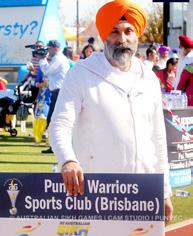






VOLLEYBALL




extravaganza organised by the Australian Council (ANSSACC), in Melbourne, 19-21 April
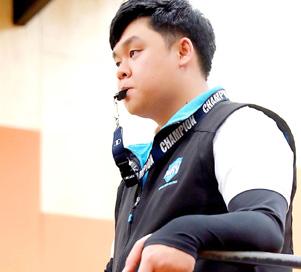

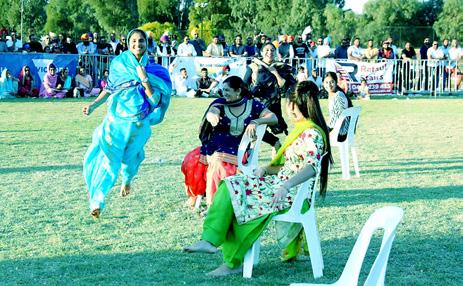
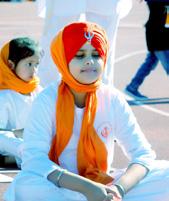


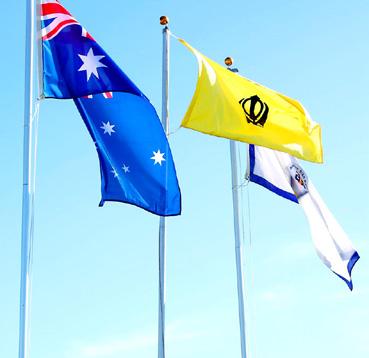
 BY JANANI KARTHIK
BY JANANI KARTHIK
India-born Australian citizen Vinod Daniel has been revisiting his roots through his charity work under the NGO India Vision Institute (IVI). Vinod and his team have been conducting eye screening camps for the underprivileged in India. After the screening, his team distributes a free pair of glasses for those who have been found to have refractive errors. So far, they have conducted over 500 vision screening campaigns across 17 states in India, since starting in 2012; they’ve also provided free eye glasses to 20,000 adults and 17,000 children, who have been detected with eye issues.
Vinod, who is an international museum expert by profession, shuttles between India and Australia. In India, he organises the countrywide eye care initiatives of his NGO, IVI. It is a joint initiative of the LV Prasad Eye Institute in Hyderabad and the Brien Holden Vision Institute in Sydney.
Describing his journey to Indian Link, Vinod said, “When I was a board member of the Australia India Council (Department for Foreign Affairs and Trade) from 20052011, I travelled frequently to India. I came to know, through a colleague who worked in the field of eye health, that many in India had no access to even a pair of glasses. While I learned that many underprivileged school children couldn’t even see the board properly as they were severely myopic, I also came to know that many youngsters were not able to perform well at work due to poor vision. Plenty of eye-related issues could be resolved by just a pair of glasses, and people were not aware of this simple solution as they had no access to eye screening. I wanted to help those underprivileged Indians get clear vision.”

In a country with over 100 million
visually impaired adults and around 10 million children affected with the problem, Vinod’s charity work has been touching many lives across the country. “It has been a rewarding experience so far, as we are making a difference in the society. It takes 4-5 years for any organisation to establish themselves and we are in our seventh year helping people get a pair of glasses and we will continue doing it,” he said.
IVI’s vision screening activities are carried out through two programs: Eye See & I Learn for children, and Eye See & I Work for adults. “We have been conducting eye screening across many corporation schools as well, in India. Some 20% of those attending screenings need spectacles. We distribute the glasses for those who need it immediately following the screening. Sometimes, for certain eye correction issues, we need to contact the person later and provide the spectacles. 65% of the glasses would be distributed on the spot
at the screening and we are now aiming to increase the distribution rate to 95%.”
Vinod, pictured above, says that the happiness that he sees in the eyes of the disadvantaged people after getting their vision corrected with a pair of glasses motivates him and his team to work harder. “Children usually don’t express much. But we see the excitement on their faces when given a pair of glasses. I remember once we conducted an eye testing camp for a nomadic community. We detected a refractive error in one person, and provided him with spectacles. After he wore put them on, he began dancing around the camp in happiness. He told us that everything around him was blurred until he wore those glasses. He was so happy to get clear vision. This happiness meant a lot to us and motivated us to reach out to many such needy.”
Apart from creating awareness about eye care and providing free glasses to the
less privileged, IVI has also been educating eye care professionals and promoting optometry research in India. Over 6,330 optometry research professionals, including practitioners, educators and students, have so far benefitted from their scholarships, seminars and optometry workshops.
Vinod’s aim is to increase the number of eye testing camps that are being conducted across the country.


“It costs Rs 60 in India to screen a person’s eye. That’s $1.20 for a single eye test. If we receive $120 dollars as a donation, about 100 underprivileged children/adults can be screened. The needy could even be provided with glasses. If many individuals donate money, it will create a real impact on the number of eye screenings that are conducted across India. Initially, our charity work was supported by a couple of organisations and when more and more organisations started donating money, the number of eye testing camps drastically increased across India. Our mission is to provide a free pair of glasses to as many underprivileged Indians as possible,” said Vinod.
You can support India Vision Institute for:
u Vision screening of underprivileged children.
u Vision screening of underprivileged adults.
u Community awareness programs.
u Capacity building of eye care professionals.
You can find more details on the Indian Vision Institute website or via email at ivi@ indiavisioninstitute.org
The countrywide eye care initiatives of IVI are a joint initiative of the LV Prasad Eye Institute in Hyderabad and the Brien Holden Vision Institute in Sydney.
So far, free glasses have been provided to 20,000 adults and 17,000 children in India.


We are looking for a special person to look after our elderly parents in their home. The house is modern and recently updated to cater for their needs.
We are looking for a special person to look after our elderly parents in their home. The house is modern and recently updated to cater for their needs.


Requirements: Nursing experience, especially with dementia patients is beneficial. Cooking and Housekeeping, along with organisation of exercise and physio routines. Most important is a kind and caring personality ����
Requirements: Nursing experience, especially with dementia patients is beneficial. Cooking and Housekeeping, along with organisation of exercise and physio routines. Most important is a kind and caring personality ����
Accommodation, food and travel to Sydney is provided. Salary will be mutually agreed subject to visa, medical, and character reference checks.
Accommodation, food and travel to Sydney is provided. Salary will be mutually agreed subject to visa, medical, and character reference checks.
If you are interested or would like more information, please contact Jason 0414987206 or jason@jjmail.me




If you know you can’t vote on Saturday 18 May, you can vote early.

It’s amazing how powerful a piece of paper can be on election day.
If you are an Australian citizen aged 18 years or over, you are required by law to vote. So, if you’re unable to make it to a polling place on election day, you can vote early at an early voting centre or apply for a postal vote. You can vote early if you are at work on Saturday 18 May, or will be outside the electorate where you are enrolled. There are other reasons you can vote early – visit www.aec.gov.au/early to find out more.


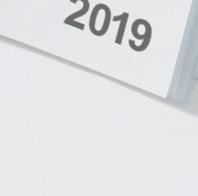




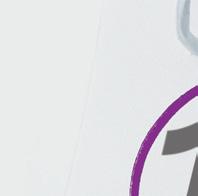


Your vote will help shape Australia.





















facilities and relentlessly pursues his dream of helping a million kids around the world.
BY PREETI JABBAL

Atoilet adventure of epic proportions changed his world. Now he wishes to share his story with everyone. With his latest book Toilet Warrior, Melbourne’s Mark Balla talks about his investment in the ‘toilet economy’ that trades dollars for dignity and profit for purpose.

From Ted Talks to scripting books, Mark Balla’s inspirational journey is fuelled and articulated with passion.
Defecation and sanitation are not topics on top of most people’s minds, but Mark compels you to think why they should be on your charity radar.
After helping over 30,000 kids get better access to sanitation, Mark has made toilets his business – albeit one where the returns are more meaningful than monetary.
As a previous Lonely Planet Survival Guide writer, Mark knows how to put pen and thoughts to paper, and he covers plenty in the eleven chapters of his book. His narrative, woven around the issue of toilet-less schools in Indian villages, is compelling and adds an immediacy to the issue rampant in rural India – an issue that we can’t imagine in our lives of western comfort.
From a chance encounter with two university students from Dharavi –Mumbai’s largest slum – to meeting Bollywood actress and sanitation ambassador Vidya Balan, Mark takes you deep inside his ‘toilet journey’.
He shares his laughter and a lot of tears as he narrates his multi-sensory experiences in India that captivated him so much that he sold his business and found another calling.

At times he deviates to other subjects like seat-belt safety and cleft lip surgery and other causes dear to him. But at its heart, this is the story of toilets, or the lack of them.
He despairs at the school children forced to defecate in the open and is devastated about girls not attending school during menstruation due to lack of proper facilities.
He rejoices when his efforts deliver results in the form of multiple toilets built with the support of locals, school staff and Rotary clubs.
He revisits the schools and people to ensure sustainability and proper use of the




You may be tempted to skim over some of the pages towards the second half, but overall it’s a well-intentioned, wellconstructed book where the main demand the writer makes on us is to have empathy for the school children bereft of the most basic of facilities and the need to act on it for improved welfare, sanitation and hygiene.
The book cover grabs your attention with a mehndi adorned hand displaying the classic finger gesture for toilet and the book is illustrated with several black and white images of people, places and of course poop houses. The subject is squeamish but the content and intent are strong-stomached.
According to Mark, human suffering, especially suffering of children, should be unacceptable to all of us. It is only through passion and compassion that we can hope to make the world a better place for those in the greatest need. Part of the proceeds from the book will directly contribute to projects that will change the lives of many.
After helping over 30,000 kids get better access to sanitation, Mark has made toilets his business – albeit one where the returns are more meaningful than monetary.






At 40, Vinod Sinha was a 3-pack a day smoker and was being urged to quit by his wife and family. He tried patches, medications, going cold turkey, and even had a session with a hypnotherapist. When he finally quit, it was because of none of these methods, but because his elderly father told him a simple truth: “If you really love your kids, you will quit smoking.” Vinod’s second child had just been born.
Twenty years on, Vinod has not looked back since. It was a simple statement from his beloved dad, but it struck a deep chord. Sometimes, sincerely meant words can have the greatest impact.
Today, those very words have been reiterated by Prof. David Currow, Chief Cancer Officer and CEO of the Cancer Institute NSW.
While there are many benefits to giving up smoking, Prof.Currow has narrowed down the top five reasons to quit for good:
Tobacco smoking is one of the biggest causes of preventable illness and death in Australia. Research estimates that two in three lifetime smokers will die prematurely from a disease caused by smoking. These diseases include many different types of cancer, heart disease,
stroke and chronic bronchitis.
“The good news is that making the decision to quit smoking, no matter how long you’ve been smoking for, is one of the best things you can do to improve your health and wellbeing
as it reduces your likelihood of smoking-related diseases and improves your health,” Prof. Currow says.
Tobacco smoke contains more than 7,000 chemicals, at least 70 of which are known to cause cancer. Non-smokers who live with second-hand smoke are at a 20-30 per cent increased risk of lung cancer and a substantially increased risk of heart disease.
“Quitting smoking for the health and wellbeing of your family is a great motivator. It allows you to have a healthier smoke-free home and sets a good example for younger generations,” says Prof. Currow.
With the current cost of cigarettes, a pack-a-day smoker could save around $10,000 each year if they give up the deadly habit. That’s enough for a nice holiday or to visit family and friends overseas. Within a few years you would have enough saved for a new car!
“The next tobacco tax increase, on 1 September 2019, will see the cost of cigarettes increase by a further 12.5%, so now is the time to quit and save that money for something more important,” says Prof.Currow.

Quitting smoking can reduce your likelihood of wrinkles, psoriasis and even losing your teeth. The good news is once you quit smoking the appearance of your skin, nails, hair and eyes can improve.

One of the first changes many smokers notice when they quit is a much better sense of taste and smell. Many smokers describe rediscovering these wonderful senses after a few days.
“You may also begin to recognise the unwanted, unlikeable smell of stale tobacco smoke on your clothes, and even on other people. This can be a great motivator to keep yourself on track having quit smoking,” Prof. Currow says.
One of the greatest gifts you can give to yourself and your family, is to give up smoking. Forprofessionalsupportandadviceonhow toquitsmokinginyourlanguage,callQuitline on 13 78 48.
Togetinformationandadvicetohelpyou quit,headtoiCanQuit.com.au

As the Indian contingents joined the Anzac Day Parade in Sydney, Melbourne and Canberra, PRIYANKA TATER and KASHIF HARRISON captured some Anzac stories on Indian Link Radio
The Sydney-based Manmohan Singh has very special childhood memories of his grandfather. Growing up in New Delhi’s Defence Colony, he spent a lot of time with the family patriarch, who would regale the youngsters with tales of his youth. You see, he had been a soldier with the British Indian Army, and had gone to war in far-away lands.
Manmohan Singh said on Indian Link Radio to broadcaster Priyanka Tater, “I remember his stories of long voyages by ship, and what they ate, but most vividly, I remember his stories of battles.”
The old soldier, who fought in both World Wars, would also bring out his medals to show the kids, “all attached on strips of ribbon.”
One of these, the young Manmohan would learn later, was the Victoria Cross, now a cherished family heirloom.
As he sees the Anzac Day parade every year, particularly the Sikh Regiments, Manmohan Singh is overcome with emotion. This year, his interview on radio had to be truncated, as he choked up and was at a loss for words. But before this, he spoke of the long army tradition in his family. Influenced by the decorated soldier in the family, two further generations have gone on to become army men. Manmohan’s father and uncle both served in India’s defence forces, and Manmohan’s brother became a doctor in the army. Manmohan himself was all set for a military career as a young man. “I dreamed of wearing the uniform as a second lieutenant, but on the day of the final assessment, my beloved grandfather passed away, and I could not make the test.” He went on to university though and became a passionate NCC cadet.
“On Anzac Day, I wish I could see my grandad march down the street with the medals on his chest,” Manmohan Singh told Priyanka. “I wish I could participate in this parade myself, perhaps with my own medals…”
This is my seventh Anzac Day parade, Arnit Roychowdhury said on Indian Link Radio. “I come to support my dad, who has been marching in Melbourne’s parade for some years now.”
His dad, (Ret’d) Col Samir Shankar Roychowdhury, has been instrumental in getting the Melbourne Indian contingent organised, and leads the group each year.
Ret’d Maj Gen Ranjit Nadkarni, who commanded this year’s parade, told Priyanka Tater, “This is our tribute to the people who served the nation, often giving the ultimate sacrifice: we march in their memory and to show our gratitude and pride.”
Meanwhile the chatty Arnit recounted fond memories of his own early life as an ‘Army kid’. “For our dads it was a strictly disciplined life and the discipline often distilled down to us kids. Of course we moved cities every few years, having to change schools and make new friends constantly… but it only made us more resilient. I’m sure many army kids will relate to what I’m saying, and to all those other aspects of army life such as the canteen and the mess and all of that!”
Both father and son reiterated that they would like other Melbournians of similar background to come out of the woods and join in the iconic parade.
As Vickram Grewal spoke to Indian Link Radio on telephone from Canberra, he stopped short for a brief moment. “That was the Governor General driving past,” he revealed, as he came back to the conversation. He was preparing for the parade with his RAAF unit, in which he serves as Director of Strategic Communications Sustainment.
This was the second year in a row that Grewal was marching with his unit, but he has been marching in the Anzac Day parade for 12 years now.
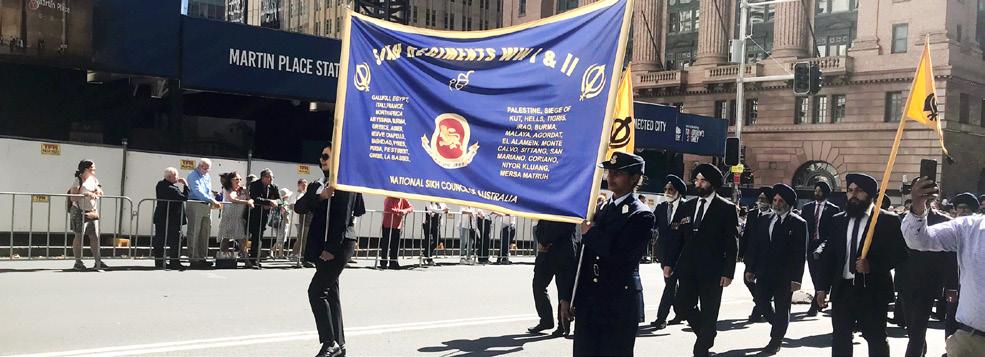
Way back in 2007, as part of the Sikh Council of Australia, Grewal and others had successfully lobbied the RSL to allow the Sikh veterans to participate in the Anzac Day parade. They had presented evidence of the Sikh participation in Gallipoli, in the form of photographs, diary entries and memoirs. The Indian involvement is now a well-recognised fact, and the quintessential Australian event of the annual parade has of course now gone on to include not only Sikhs but also those of other ethnicities.

To this day, though, Grewal continues his passion for unearthing more Sikh stories from the two World Wars. He recounted to Priyanka Tater the story of Manmohan Singh, a British Indian Air Force pilot, who was in Broome WA in 1942 when a Japanese air attack destroyed his unit. He survived the attack, only to later drown in the harbour.
“I’m also keen to see more people of colour in Australia’s Defence Forces,” Grewal, a thirdgeneration military man, revealed. “Currently I am part of a WhatsApp group of Sikhs in the ADF. I’d like to see parents encouraging their kids to take up this line of work, as opposed to the traditional – medicine and law and such.”
Seeking a suitable match for a 33-yearold girl, 5’6”, Melbourne based CPA, working as a consultant. The boy should be well qualified, professionally settled in Australia, with a minimum height of 5’9”. Contact n.bhandari085@gmail.com or + 61433391881.
Seeking professionally qualified settled match for Sydney based, never married Aus citizen, Hindu, Punjabi Khatri, 45, 5'3" slim, fair, attractive girl. Girl is postgraduate and is working on a good position in government organisation. Please send details with photo to Indsyd2016@gmail.com
Seeking suitable professional boy born and brought up in Australia for young attractive girl, never married, 31, 5'2". Looks much younger, born and brought up in Sydney. Professional educator, Hindu Indian well settled family. Please email to rtmkh8064@gmail.com or call 0426 180 427.
Seeking professionally qualified match for attractive 28 year old, 5’ 3” Punjabi Hindu Saraswat Brahmin BAMS doctor girl. DOB: Apr 1990. Currently living and practising in Chandigarh. She is passionate about her work as an Ayurveda doctor and enjoys traditional Indian culture. Looking for well settled, educated, non-drinker and nonsmoker Punjabi Brahmin boy in Australia or India. Please send details with photo to yoginderkumar@gmail.com
Beautiful, highly educated with very good family background, soft spoken, career oriented, 33-year-old vegetarian Brahmin girl, working, well settled in Sydney, seeks an educated, teetotaller boy with good family background. Prefer Australian citizen or PR.
Please contact rajsyd83@gmail.com


Seeking 25-30-year-old Hindu/Punjabi girl from Australia for our 32-year-old specialist doctor son, 5’9", born and brought up in Sydney. Please respond: gupta_rsr@hotmail.com or ph 0414282510
Alliance invited for well educated, divorced, 5' 9", 1975 born Sikh Khatri boy. Working and self employed, earning 100k per year. Looking for compatible Sikh girl from Australia. Early marriage. Phone: 0422102242 or Email: ghai07@yahoo.com
Seeking professionally qualified, settled match for Sydney based, never married Aus citizen, Hindu, Punjabi Khatri 44, 6', and athletic built boy. He is project manager with engineering background and is working in a private organisation. Please send details with photo to Indsyd2016@gmail.com
Australian citizen, male, professional, working for Government department, owns house in Sydney, huge assets. Seeking suitable match for marriage. Contact sydneyboy293@yahoo.com or 0438029833
May 2019
BY MINAL KHONAMinal Khona has been reading tarot cards for the last two decades. She uses her intuition and connect with the cards mostly to help people.

March 21 - April 19
Blocks, recuperation, money from more than one source and emotional highs and lows span this month for Arians. Any delays are destined, and will lead to future success. If your relationship seems like it is at a standstill, let it go for a while, till things change. An unscheduled trip is good as it could bring you luck. Blocks on the career front are temporary and soon you will have more work than you can handle. Break free from past obsessions.
LEO
July 21 - Aug 22
An unexpected reunion with an ex or an old friend is on the cards. Plans at work face hurdles and you will have to dedicate time to sort them out. That’s because you are taking on more than you can handle. Take adequate rest to avoid health problems. An unexpected financial gain is anticipated. Your good judgement and ability to solve problems lead to your success. A friend, or lover or a new acquaintance will be beneficial to your career.
SAGITTARIUS
Nov 22 - Dec 21


A major Arcana indicates an important event or shift. This month is about spiritual quests, keeping up appearances, a happy announcement in the family etc. You will want to improve your home or health, but your work will keep you busy and away from home. Feeling tired and run down, a new wardrobe might pep you up. Do not merge business with friendship. Good news regarding money is foretold. Keep an open mind to everything and be patient till everything is resolved.
VIRGO Aug 23 - Sep 22





Activity in the mental realms and money matters, starting your own business, or even a break to calm your mind is on the anvil. An unfair situation needs delicate handling, so think before you speak. Things could be tense at work. Health needs medical attention; a dispute over money delays matters, but they will get resolved. Pray for what is rightfully yours and it will come to you. People around you will be supportive and a new love is on its way to you.
CAPRICORN

Dec 22 - Jan 19
Life altering events related to your family, work, love life or friends could take place which leave you feeling powerless. It’s time to take the rose-tinted glasses off in a troubling situation. Anxiety attacks could mar your health this month, so take enough rest. Don’t let appearances or what others say, take you away from your goal. What you want is under your nose, you only have to look for it. An attitude of gratitude makes things better.
A tough month for some of you, as you could face conflicts and unforeseen problems. A trip won’t be as pleasant as you’d hoped. Things at work are not going to be all smooth sailing. Lower your expectations of others or you will be very disappointed. A recurring illness continues to irritate and it might just be here to stay. Money is stable but it won’t stop you from worrying. You will succeed in some ways and in some cases, maybe not.
GEMINI
May 21 - June 20
A good month for Geminis as the card representing the sign shows up. You are in expansion mode, at work and in your personal life. Things are at a standstill in your love life, but you can expect validation from influential people. Travel for work, not pleasure, is predicted. Your health improves if you have been unwell, as will your financial situation. Meeting the right people could benefit your career prospects, and chances are you will. Be patient and diligent in your efforts.
LIBRA

Sep 23 - Oct 22
An element of surprise, partial success and a possibility of a reunion are on the cards this month for Librans. Money comes in, earlier than expected. In your love life, you will want to analyse the quality if you are single. A lawsuit could get settled in your favour. At work, beware of someone trying to tap into your insecurities to make you feel that your job is in jeopardy. One cycle is going to end and a tense situation will become easier.
AQUARIUS

Jan 20 - Feb 18
You want to streamline your finances for future security, and a new business showing profit will be a pleasant surprise. Professional advancements bring joy and you will plenty to get by. A health condition continues to trouble you and a visit to the doctor could be painful. Be careful about losing money through your own carelessness. You could begin a new venture with someone you like very much. Luck is on your side but stay detached in matters of the heart.
You are in a thoughtful mood, thinking about your life and hopes. An unexpected financial opportunity will come your way. Existing situations cause anxiety and you need to get some rest. Unsettled conditions will resolve themselves; emotional problems come to an end. If in a relationship, you won’t be able to commit. An attractive job offer could come your way. A greater hand is steering your destiny. You will understand why you had the experience you had. Let go.
SCORPIO

Oct 23 - Nov 21
The usually intense Scorpios could find themselves being practical like Capricornians. Work, scholastic endeavours and practical idealism are your foundations for the month. Your self-esteem remains high, even in a relationship going nowhere. An unexpected piece of good news is indicated, as is a trip for educational purposes. Work puts you in a despondent mode but someone cheers you up. Money will be slow coming in but that will change soon. Be open to listening to new ideas and working on them.

Feb 19 - March 20
You might meet a Sagittarian who changes the way you think or feel about a situation. Or, you might find yourself being outspoken, like one. Matters related to philosophy, spiritualism and work occupy you this month. A new approach to work could turn into a lucrative and promising project. The usually perfectionist Pisceans might get a little lackadaisical about emotional matters. An existing health condition needs attention. Change is in the air but not at the cost of your self-esteem.




Your character in your new movie
The Extraordinary Journey of the Fakir, Ajatashatru “Aja” Lavash Patel, wants to travel to Paris. A large portion of the movie was also filmed there. Do you have a favourite memory of your time in Paris?
Sitting court side watching Rafael Nadal playing on Centre Court at Roland Garros!
There’s a character in the movie, a 27-year-old, exploring her sexual identity and whether or not she’s a lesbian. India decriminalised Section 377 only recently, with homosexuality getting legal approval and recognition. According to you, how have audience reactions to gay characters on screen changed over the years?

The reaction to the decriminalisation of article 377 in India was amazing. The entire business community supported the Supreme Court judgement, and most online and retail businesses had some form of celebration. As far as entertainment goes, with platforms like Netflix screening in India, gay characters are not at all unfamiliar to Indian audiences. There have been a number of important LGBT characters in Indian films and TV shows, and more and more people are expressing themselves freely. I think it’s great!
You play a street magician in the movie, which also involves elements of karma and chance. Do you personally believe in karma?

I consider myself extremely lucky, with the chances and opportunities that life has given me. Maybe I was a really good guy in my past life!
This movie features a few songs or some sort of musical element. We also hear you sing on a couple of occasions. Do you have a favourite musical? Indian films are full of wonderful music and songs. One of my current favourites is composer Sean Roldan. I also really like Amit Trivedi’s music and I’m happy that he composed the songs for Fakir as well.
Your character in the film is understandably obsessed with IKEA. If we happen to run into you at an IKEA store, which level would you most likely be on?
Whichever section my wife likes! I love setting up our den where my sons and I watch sports, so we might be at the level that has the loungers.

Your character in the movie comes back to India to work as a teacher. What profession would you have chosen, if you hadn’t been an actor?
I always wanted to be a chef! I think I would have been very successful at that.

How would your character Aja rate this interview out of 10?
This is a truly unique interview! I have really never given answers to questions like these, so for originality I’m sure Aja would give this interview a 10/10.
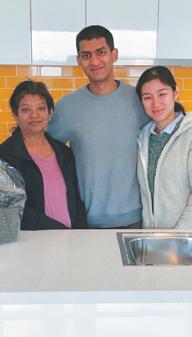
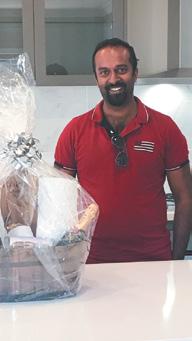


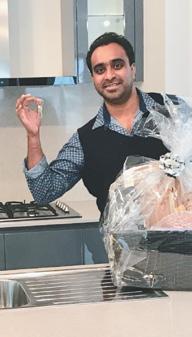



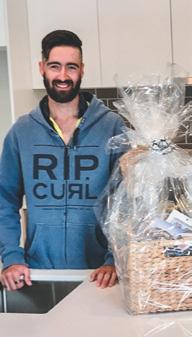

The show will no longer go on at the iconic 71-year-old RK Studios in Mumbai.
It will now make way for a swank residential complex-cum-shopping plaza through its new owner, realty major Godrej Properties Ltd.
GPL has purchased the 2.20 acres (roughly, 100,000 sq. feet) RK Studios premises in Chembur, north-east Mumbai - founded in 1948 - which were gutted in a major fire that engulfed it on September 16, 2017.

GPL, which has inked the deal for an undisclosed amount with the Bollywood's Kapoor clan - plan to now convert it into a modern residential apartments complex and a luxury retail centre spread over a saleable area of around 350,000 sq. feet.
Leading realty players though point out that the current commercial property rates in and around Chembur are in the range of Rs 24,000-Rs 28,000 per sq. feet depending on the locality.
Executive Chairman of GPL, Pirojsha Godrej, said the deal fits with the company's strategy of deepening its presence in key locations across India's leading cities.
"We will seek to ensure we celebrate the remarkable legacy of this site with the goal of delivering an outstanding lifestyle for its residents," Godrej said.
Veteran Bollywood actor Randhir Kapoor, son of the founder of RK Studios, the legendary Raj Kapoor, said,
"This property in Chembur, has been of tremendous significance to my family over the many decades that RK Studios has operated from there. We are excited to have chosen GPL to script a new chapter for this location and build upon its rich history."
According to sources, work on the designs for the mega-project will start shortly and after obtaining the necessary approvals, the construction of the housing-cum-shopping complex could begin by early 2020.
Incidentally, the studio property sale deal comes barely eight months after late Raj Kapoor's widow, Krishna, passed away at the age of 87, on 1 October 2018.
Soon after the blaze, which also reduced to ashes precious memorabilia and costumes from the RK Films and Studios banner films over the past seven decades, the Kapoor family had expressed their inability to revive it or continue maintaining it.

The RK Studios was the shooting venue for some classics of RK Films like Aag (1948), Barsaat (1949), Awaara (1951), Shree 420 (1955), Jaagte Raho (1956), Anari (1959), Sangam (1964), Mera Naam Joker (1970), Bobby (1973), Satyam Shivam Sundaram (1978) and many more.
Raj Kapoor passed away in June 1988 after which some of his incomplete films like Ram Teri Ganga Maili (1989) Henna (1991) were also made here.
Poor Akshay Kumar. His Canadian links have put a few chinks in his deshbhakt image this past week. He has faced flak for talking about patriotism despite not being an Indian citizen.
The trolls claimed he didn’t turn up to vote this election, despite that wellpublicised (but “non political”) interview with PM Narendra Modi. And oh, should his National Award for Best Actor (Rustom, 2016) be revoked?
As it turns out, it’s all good. The honorary Canadian citizenship came after he was brand ambassador for Canadian tourism in India in 2010.
But in these ultra-nationalist times, the ‘Canadian’ tag is sticking on days after the furore died down. Videos have been resurrected from a Toronto stage show years ago where the star claimed, “This is my home and this is where I will return after I retire from the movies.”
But you know, being a true blue Punjabi and all, we could surely have guessed there was a bit of “Can-ay-dda” in the dude…
Patriotism has been a favourite theme in many of Akshay’s films: Kesari, Baby, Holiday - A Soldier Is Never Off Duty and Airlift.

Poor Mumtaz. For the second time, she has had to wake up to news reports that she had, er, died.
This time round, her daughter Tanya Madhwani had to take to a video message on social media to say all is well.
"My mother is fine. She is in London... She is sending her love to you all."
But she wrote on Instagram, “So exhausting, another rumour of my
mother's death. She is healthy and looking beautiful as always and has asked me to let her fans know she is well! It's all rubbish.”
Reportedly the veteran actress was upset and irritated at the news (which apparently even well-regarded journo Komal Nahtatweeted about). But later as her family in London laughed about it all, she relaxed.
The actress, it is claimed, is enjoying retired life playing grandma to four little ones.
Hmm, wonder if she sings Bindiya chamkegi to keep them entertained?
Maybe she’s calling out Loafer to those spreading the rumours that she’s kicked the bucket… or Dushman, or maybe Mujhe Jeene Do!
Stop us, somebody…
Poor Rakul Preet. Even after critical acclaim, she says she hasn't made a name for herself in Bollywood, and still has a long way to go.
Rakul made her acting debut in 2009 with Kannada film Gilli. She ventured into Bollywood in 2014 with Yaariyan and was later seen in Aiyaary in 2018.
"I don't think I have yet made a name for myself in Bollywood. I don't think I have done anything. In fact, I always say that the fact that 'I am an actor' has not sunk in my head. I have been in this industry, in films for five to six years now," Rakulsadi recently, indulging in a bit of self-analysis.
She added, "Having done so many films even in the south, I mean I take my job seriously, but I don't take the fact that I am an actor seriously."
The 28-year-old will soon be seen in De De Pyaar De, due for release on 17
+ Share your views with us on our Facebook page /IndianLinkAustralia
May. In this film she plays the Londonbased girlfriend of a man (Ajay Devgn), old enough to be her dad. All is well until he takes her to India to meet his familyhis parents, his kids, and his ex-wife, the gorgeous Tabu.
Tabu, did you say? This one goes on our must-see list, then…


AAMIR: FORREST
GUMP DESI STYLE
Poor Aamir Khan. He’s looking at yet another strict diet plan for his new movie role. This time round, he will be eating less, to lose some weight instead of putting it on like in Dangal
It’s all for Laal Singh Chaddha, which is the Hindi remake of Tom Hanks' 1994 classic Forrest Gump, to be released around Christmas in 2020.
The film, which is expected to go on the floors in October, is written by Atul Kulkarni and will be helmed by Secret Superstar director Advait Chandan.

Aamir had announced the project on his birthday in March. The actor, who tasted failure with his last film Thugs of Hindostan, said he would be losing around

20 kgs for his role in Laal Singh Chaddha. He also shared that he would be sporting a turban for some segments of the movie.
Forrest Gump, directed by Robert Zemeckis, is based on Winston Groom's 1986 novel of the same name. The film went on to win six Oscars, including Best Picture, Best Director and Best Actor for Hanks.
It was 106 years ago this month (3 May to be exact) that Dadasaheb Phalke's Raja Harishchandra released, marking the celebratory beginning of the Indian film industry.
With this film, India's first full-length feature, Phalkeset the pace for the silent era which went on till the 1930s when the talkies emerged, and became regarded as the father of Indian cinema.
Silent cinema may have become rare in today's time, but it hasn't kept the film world away from appreciating its beauty.
Kolkata-based filmmaker Aneek Chaudhuri, whose latest works include
two silent dramas on social issues - White and Cactus–is a fan.
Cactus will be a part of the film market at the Cannes Film Festival later this month.
Earlier this year, a slew of Indian silent films by Phalke, Baburao Painter, PV Rao, Kalipada Das, Shyam Sundar Agarwal, GP Pawar and Kanjibhai Rathod from the collection of the National Film Archive of India (NFAI), were screened in Paris.
Last year, southern filmmaker Karthik Subbaraj experimented with the silent medium with Mercury, a horror thriller movie starring Prabhudheva.
Amit Kumar's 2003 film The Bypass was a short silent film starring Nawazuddin Siddiqui and Irrfan Khan.

Film historian SMM Ausaja recounts the 1987 Kamal Haasan-starrer Pushpak, about an unemployed young man, as a prominent silent movie in recent history.
"Silent cinema is a universal medium which is not dependent on a language and can transcend to any country. In today's era of talkies, silent is niche. It has become an experimental genre," Ausaja told IANS.
Match the following stars to the tweets below:

Jacqueline Fernandez, Priyanka Chopra, Karan Johar, Akshay Kumar, SRK
Little one was a bit confused between ‘Boating’ and Voting, so took him along to experience the difference.
I have never hidden or denied that I hold a Canadian passport.
Two beautiful, talented, young stars making their debut in Hindi cinema. Each comes with their own unique story and each with a promising bright future! @ tarasutariaa@Official_Ananya
Always a Sucker for @TiffanyAndCo@BBMAs
Extremely sad at the news of bombings in Sri Lanka. It’s unfortunate that one is not able to see that violence is like a chain reaction.

People who know me, know that I am not an astronaut. Or a space scientist of any sort. Yet, few know that this month I was involved in the design of a space shuttle’s interior. I have helped background research (which commenced with a thorough study of the life-like model that is displayed in a Sydney museum); have provided input on the development and positioning of the fuel tanks; have supervised interior design of the cockpit, and have assisted in creating never-seen-before living quarters on board for astronauts, including kitchen, sleeping, toilet and shower, entertainment, and storage areas. The final design (and prototype) was submitted for consideration to an expert panel the details of which I cannot make public as yet, and I have just received news that it has been – accepted!
What a learning experience it has been. Now that I have permission to talk about it, I have regaled my kids with nuggets of information gathered during my involvement with space shuttles, such as - did you know astronauts sleep standing up? They enter into a giant sack-like blanket which is secured to the wall, belt themselves in, and nod off. Fascinating stuff.
Thanks to my new-found knowledge in the area, I was contacted recently by a young lady (a fan of mine, NBD) who is considering a full career in the field of applied interferometry. No, that’s not the science of sticking your nose into other people’s business, but a highly specialised field of photographing earth from space. Advising her, I was completely hooked, and now possess an enviable collection of images of our beautiful planet taken from space (with special focus on India and Australia).
Having come off the space project until my services are required again, I found myself roped into a study of scorpions - this

time by a young friend who will probably be doing his PhD on this mini-beast. Datacollecting with him for an early submission, I have added to my own knowledge of this strange creature whose sting lies in its tail. To tell if a scorpion is dangerous, check the thickness of the tail – if it is thick, it is poisonous; if thin, it is not. Also, did you know, there are light sensors at the tip of the tail which act as its “eyes”? These come in handy when the scorpion has its head stuck underground.
Mummy scorpions carry their young on their backs – and if one falls off, they put their pincers down on the ground, so the little one can get back on.
Of course, my capabilities extend not only to science, but arts as well. I reached out this month to a mime artist who had hit rock bottom (with mimer’s block, a mimer’s version of writer’s block), just as he was about to go on Channel XY’s Miming with the Stars. With my advice on his chosen piece (eating a hamburger), he romped home with a score of 18/20: I’m pretty sure what clinched it was my suggested facial expression of disgust at the pickle inside, and the actions of extricating and then discarding it.
Only weeks ago, I tried my hand at poetry, another first for me, as I guided a young upcoming poet in her work. The end result, a powerful treatise
on wildlife, has already been published (in the columns of this very newspaper).


I’ve dabbled also with advice to sportspersons. A star soccer player was coached by me this month. Not in his sport, though, but in a presentation he had to make titled, “My favourite sport”. He shone through, with this critical appraisal at the end of it: “Your love of the game was evident”. Hurrah for me, I say!
Owner of increasing proficiency in many varied areas, I am still called upon for expert advice in areas related to my regular work – writing. Two superb and critical book reviews have been written under my guidance this month. Gordon has a Snookie by Lisa Shanahan was given the thumbs up, while Hole in the Zoo by Chloe and Mick Inkpen was completely smashed to smithereens.
Homework - with 10-year-old Beti (daughter) and 7-year-old Beta (son) - has been exhausting, but fun, this past month. Happy Mother’s Day to me!






